Western microwedding + elopement photographer
If you’re looking for all the juicy information on how to self-solemnize in Colorado, you’re in the right place. In this blog post, I’ll share all of the legal requirements for self-solemnization as well as how to plan a one-of-a-kind “just us” ceremony.
In recent years, self-solemnization has captured the hearts of couples seeking a more personalized and intimate approach to tying the knot. This innovative concept allows couples to legally marry themselves without the need for witnesses or an officiant, offering unparalleled flexibility and freedom to craft their special day exactly as they envision it.
How to Get a Marriage License in Colorado
Self-Solemnization Ceremony Ideas
How Does Self-Officiating Work?
Completing Your Marriage License for Self-Solemnization
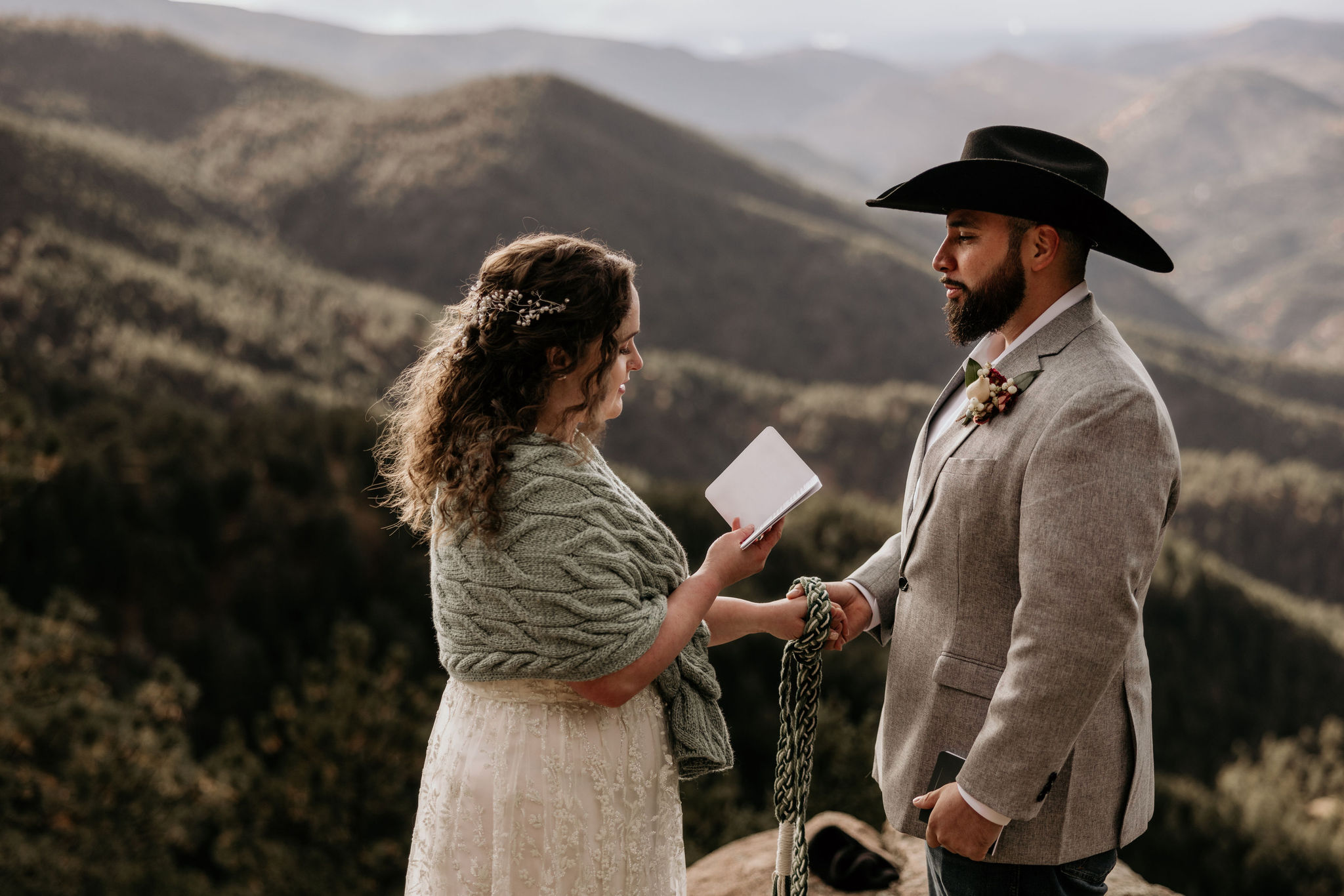
What is Self-Solemnization?
But what exactly is self-solemnization? It’s the ability for a couple to legally marry themselves without any witnesses or an officiant. With self-solemnization, couples can exchange heartfelt vows and legally bind their marriage, all on their own terms. Unlike traditional ceremonies where an officiant presides and certain verbiage is often required to make the ceremony legally binding, self-solemnization empowers couples to take center stage and orchestrate their wedding ceremony from start to finish.
While self-solemnization may sound like a novel idea, it’s a legally recognized practice in several states across the country, including Colorado. Notably, Colorado offers one of the easiest processes for self-solemnization. Other self-solemnizing states include California, Illinois, Maine, Nevada, Wisconsin, the District of Columbia, Kansas, and Pennsylvania. Do your research though, as each of these states may have its own unique quirks and conditions for your self-solemnizing ceremony, such as federal government recognition or specific religious ceremonial requirements.
Here in Colorado, couples can officiate their own union and seamlessly navigate the self-solemnization process by completing their marriage license with a few small modifications. The allure of self-solemnization lies in its simplicity and flexibility. Whether it’s a mountaintop adventure elopement or an intimate backyard micro wedding, self-solemnization opens the door to endless possibilities for crafting a deeply personal, meaningful, and unforgettable wedding experience.
So, if you’re ready to take the next step in your journey together, let’s dive into the ins and outs of self-solemnization in Colorado. From obtaining your marriage license to crafting the perfect ceremony, I’ll be your guide every step of the way as you prepare to say “I do” in the most authentic and heartfelt manner imaginable.
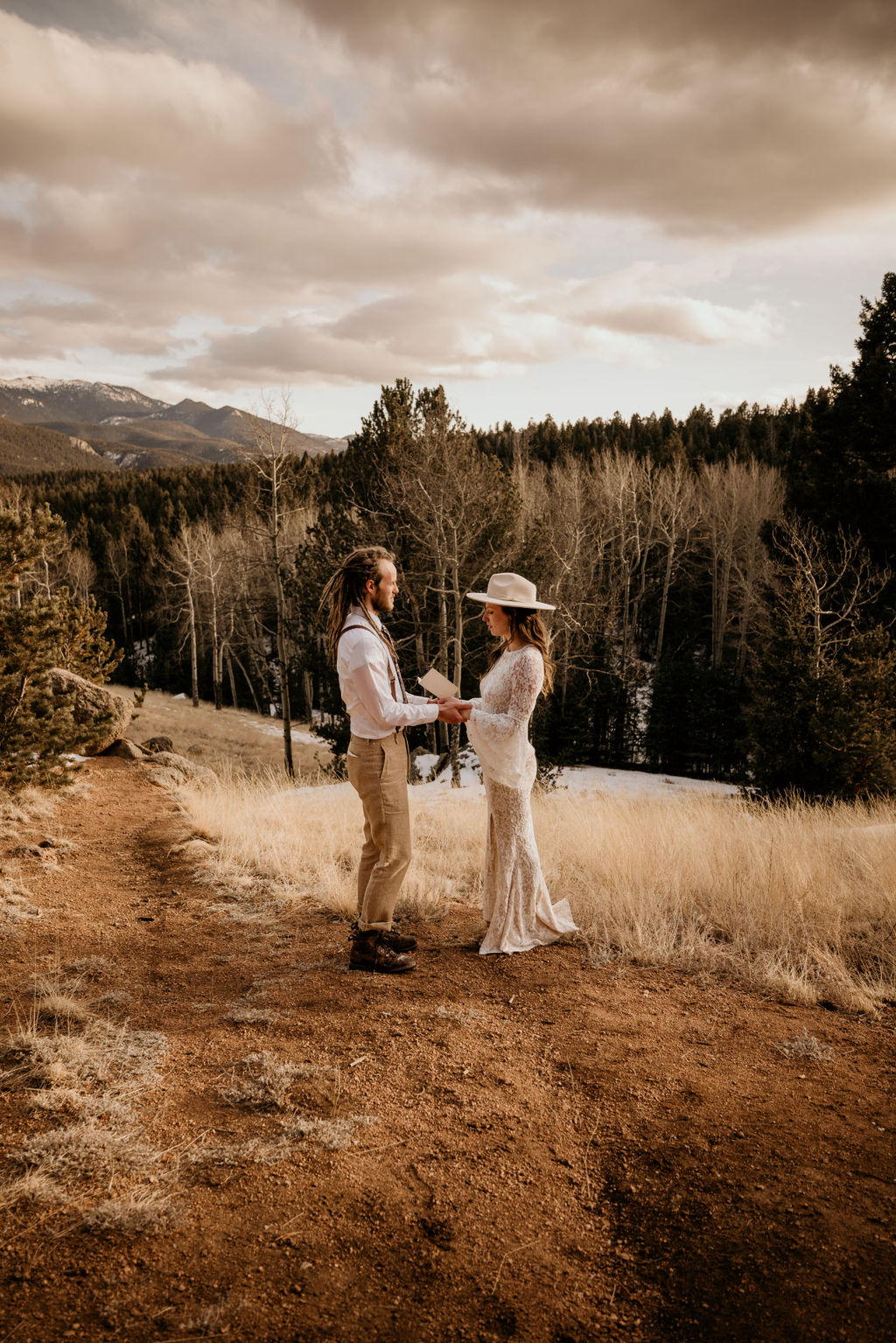
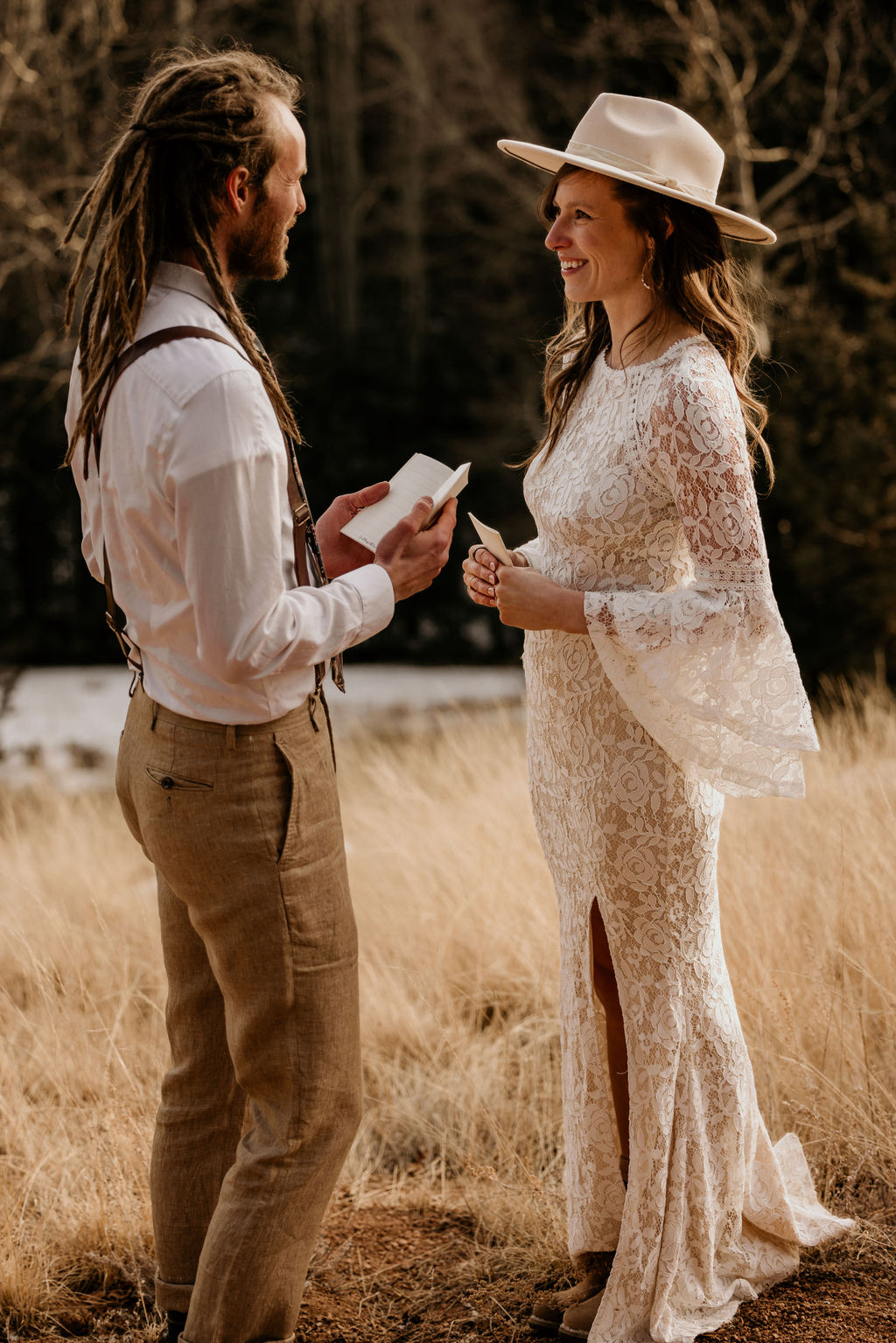
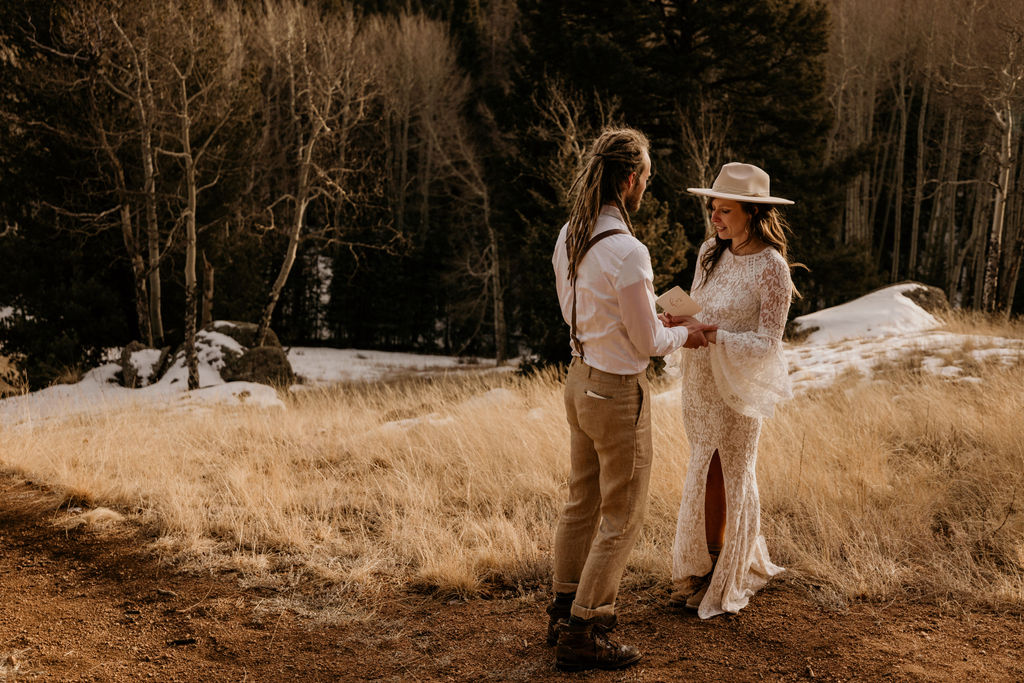
How to Get a Marriage License in Colorado
Securing your Colorado marriage license is a necessary step in planning your wedding or elopement, especially if you’re considering self-solemnizing. Here’s a streamlined guide to ensure you understand the process, whether you choose to apply online or in person.
Online Application Process
For couples opting for convenience, Colorado offers an online option to apply for your marriage license. It’s crucial to remember that during your virtual appointment with the County Clerk and Recorder, both parties must still be physically in Colorado. Before the video call starts, make sure to have your valid IDs and your debit or credit card payment ready.
Additionally, if you choose to apply for your Colorado marriage license through an online appointment, you’ll need a Colorado address where the County Clerk and Recorder can mail your marriage license. Once again, you must be within the State of Colorado and both parties must be in the same room, on the same screen, at the same time. This requirement underscores the importance of planning, particularly for those not residing in the state but wishing to wed here.
Given the need for a Colorado mailing address, couples coming from out of town might find it more practical to apply for their marriage license in person rather than online.
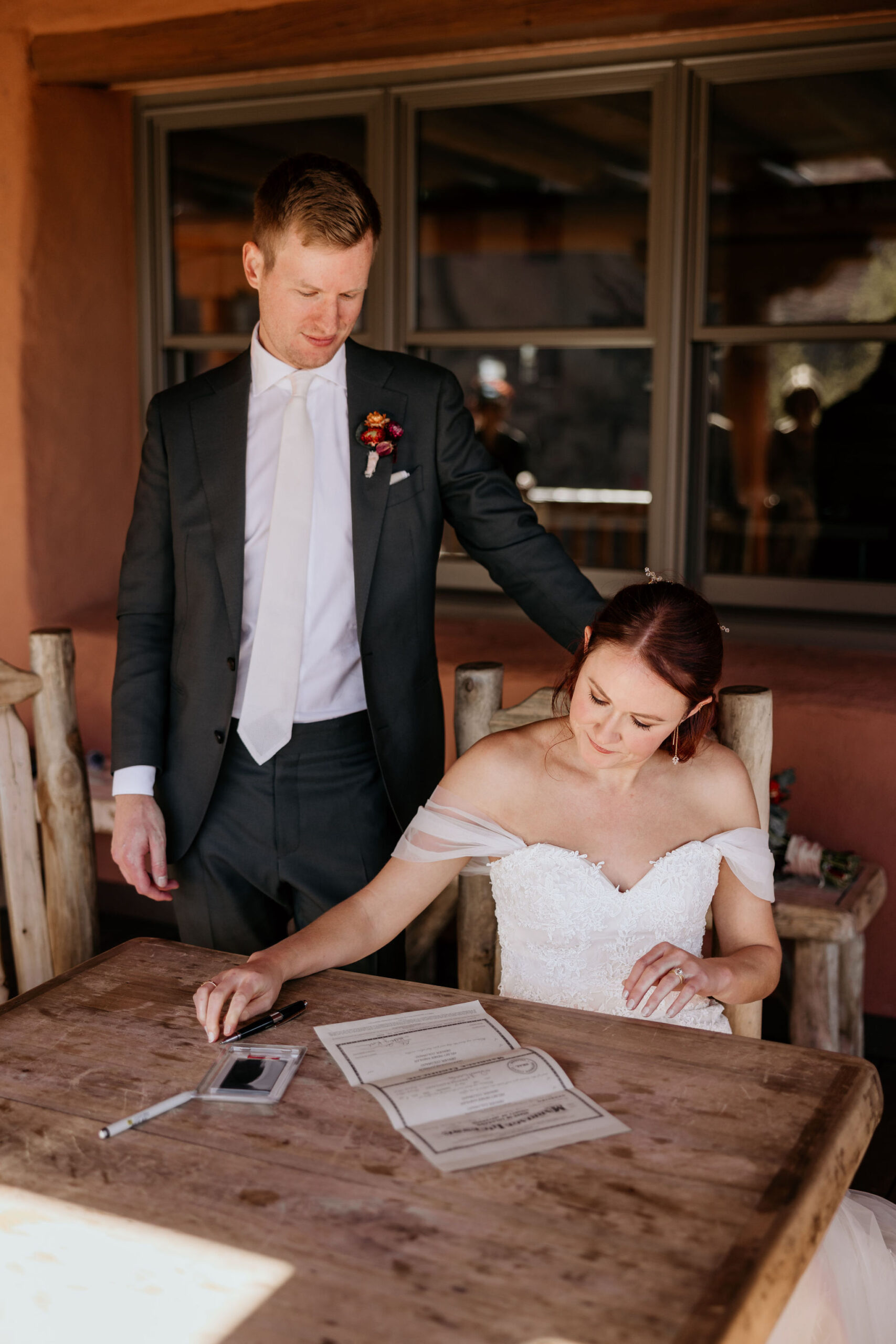
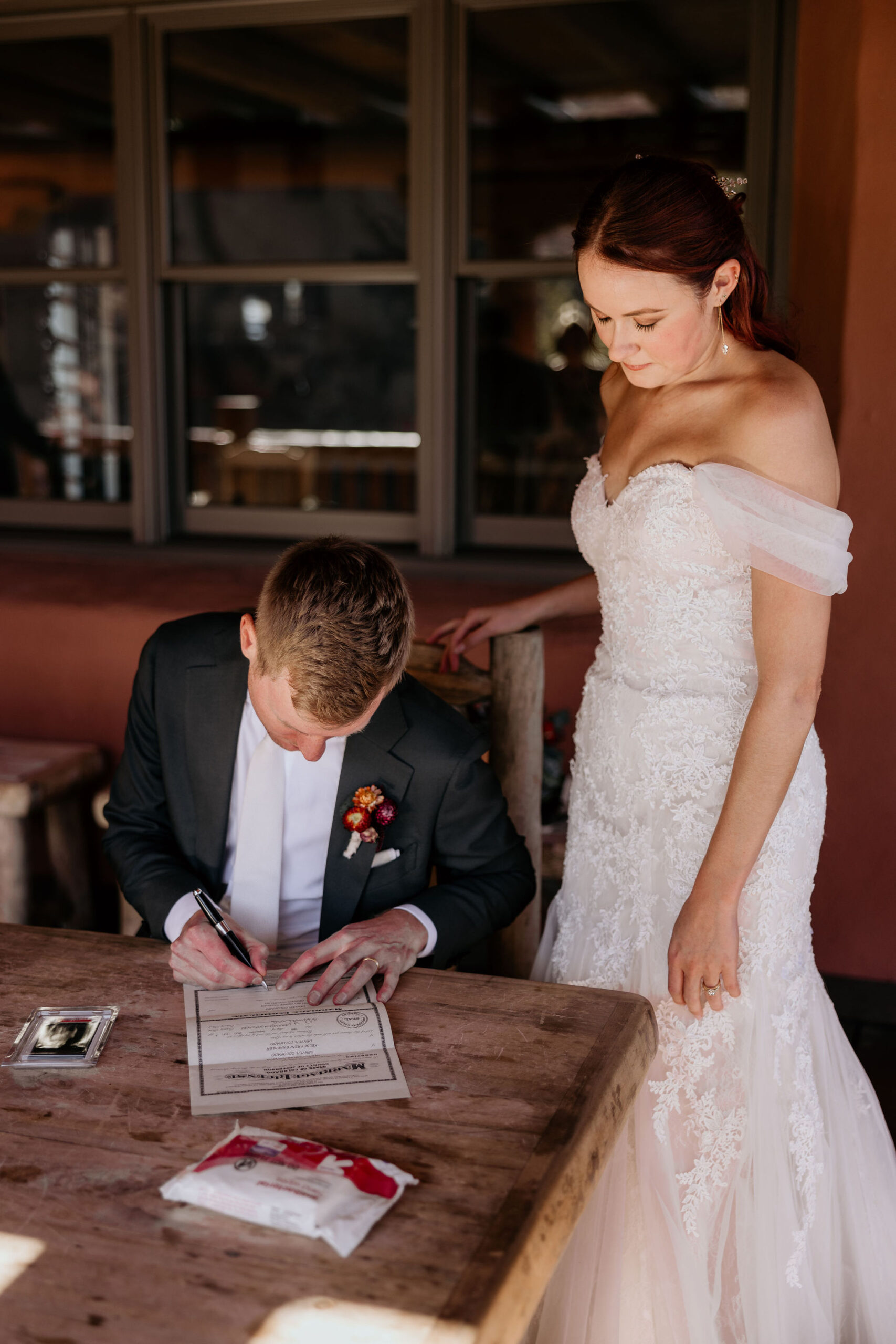
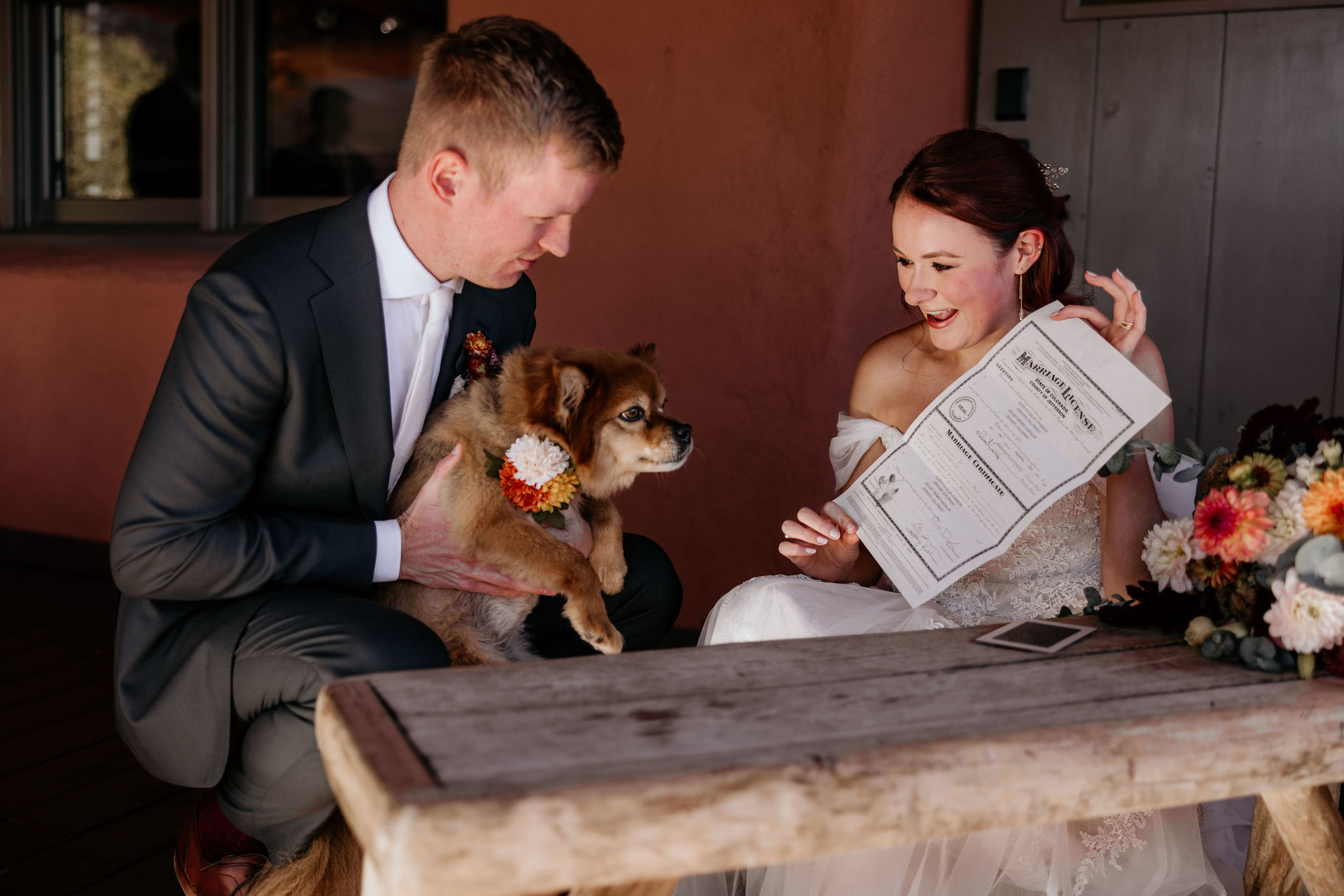
In-Person Application
To apply for your Colorado marriage license in person, begin by completing the online marriage or civil union application. You don’t need to create an account or log in to fill out the application, making it a straightforward first step. Next, schedule an in-person appointment with the Denver County Clerk & Recorder’s Office. Remember, appointments are mandatory for both parties and can be booked up to 7 days in advance using the office’s booking calendar. If marriage license appointment slots in Denver are filled, consider regularly checking for cancellations or reaching out to neighboring jurisdictions such as Jefferson, Adams, Douglas, or Arapahoe Counties for availability.
If this feels a bit overwhelming, couples can alternatively choose to complete the legal requirements in their home state. If you choose to do so, however, you will need to complete and sign your marriage license in your home state and cannot complete it during your Colorado ceremony.
Special Considerations for Smaller Mountain Towns
If appointments in Denver are fully booked or you’re drawn to the charm of a smaller mountain town for your ceremony, be aware that clerk and recorder offices in these locations may not offer online appointments due to their limited size. Additionally, their in-person slots tend to fill up quickly and some offices do not serve non-residents. To avoid any hiccups, it’s advisable to verify the specifics with the office well in advance of your planned wedding date or to obtain your marriage license in Denver before traveling to your mountain destination.
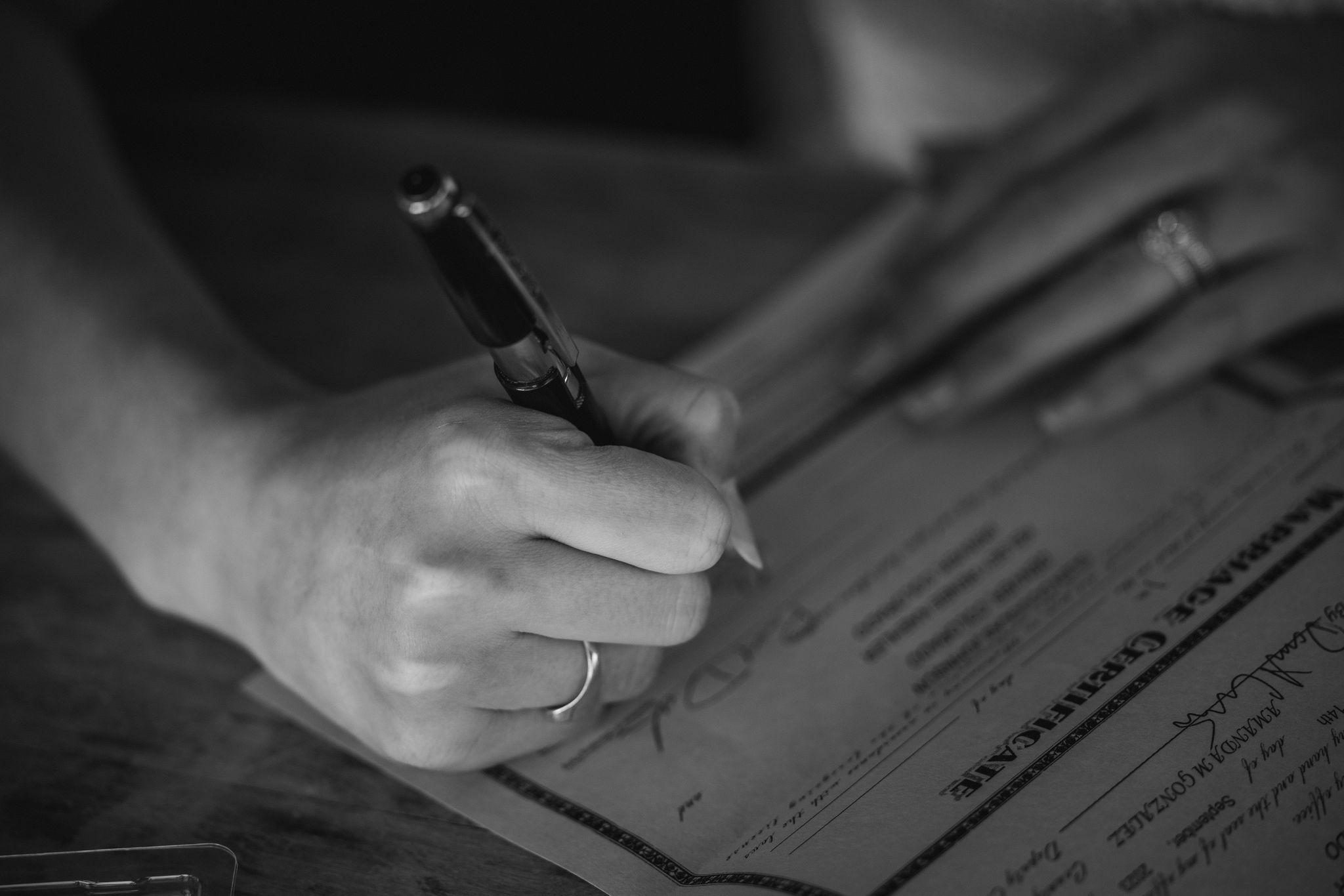
Colorado Marriage License Timing and Fees
Regardless of how you apply, the cost for obtaining your Colorado marriage license is $30. Your marriage license is valid for use within 35 days from the issue date. This means that you must sign and complete your license within this 35-day period for the state to legally recognize your marriage.
By following these guidelines, you can navigate the process of obtaining your Colorado marriage license with ease, whether you’re planning a grand celebration or a more intimate self-solemnized ceremony. Remember, the key to a smooth experience is preparation and understanding the specific requirements of the county where you plan to apply for your license.
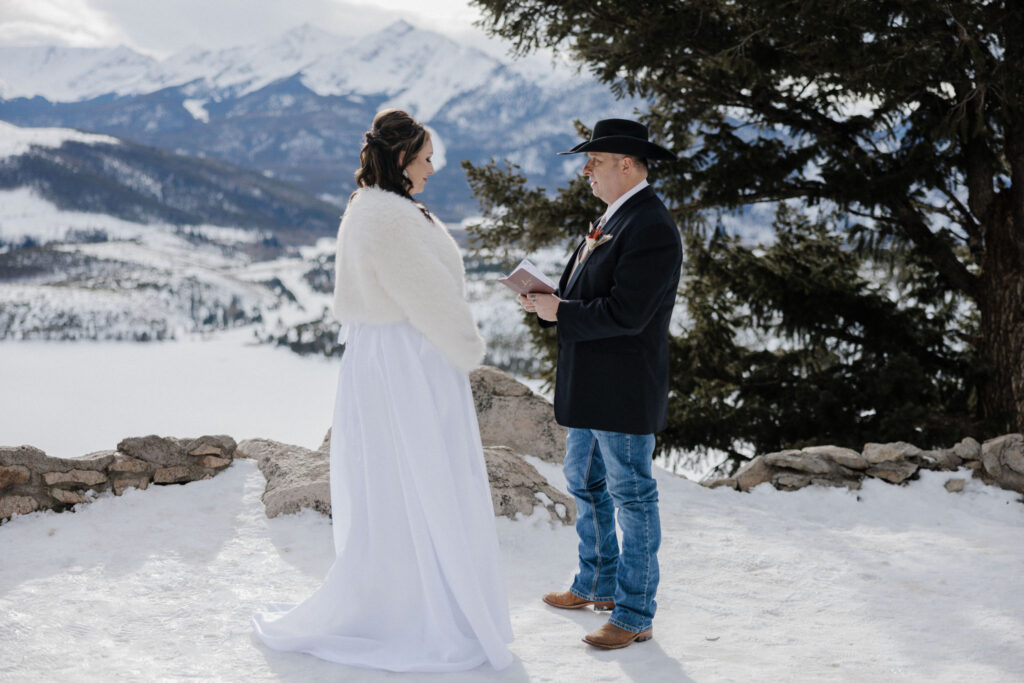
Self-Solemnization Ceremony Ideas
Self-solemnization offers a wonderful opportunity to personalize your ceremony in a way that deeply reflects your relationship. Without the presence of an officiant, you and your partner become the focal point of the ceremony, guiding each other and your guests (if you choose to have them) through an intimate and meaningful experience. Here are some self-solemnization ceremony ideas to make your wedding day uniquely yours and ensure everything runs smoothly.
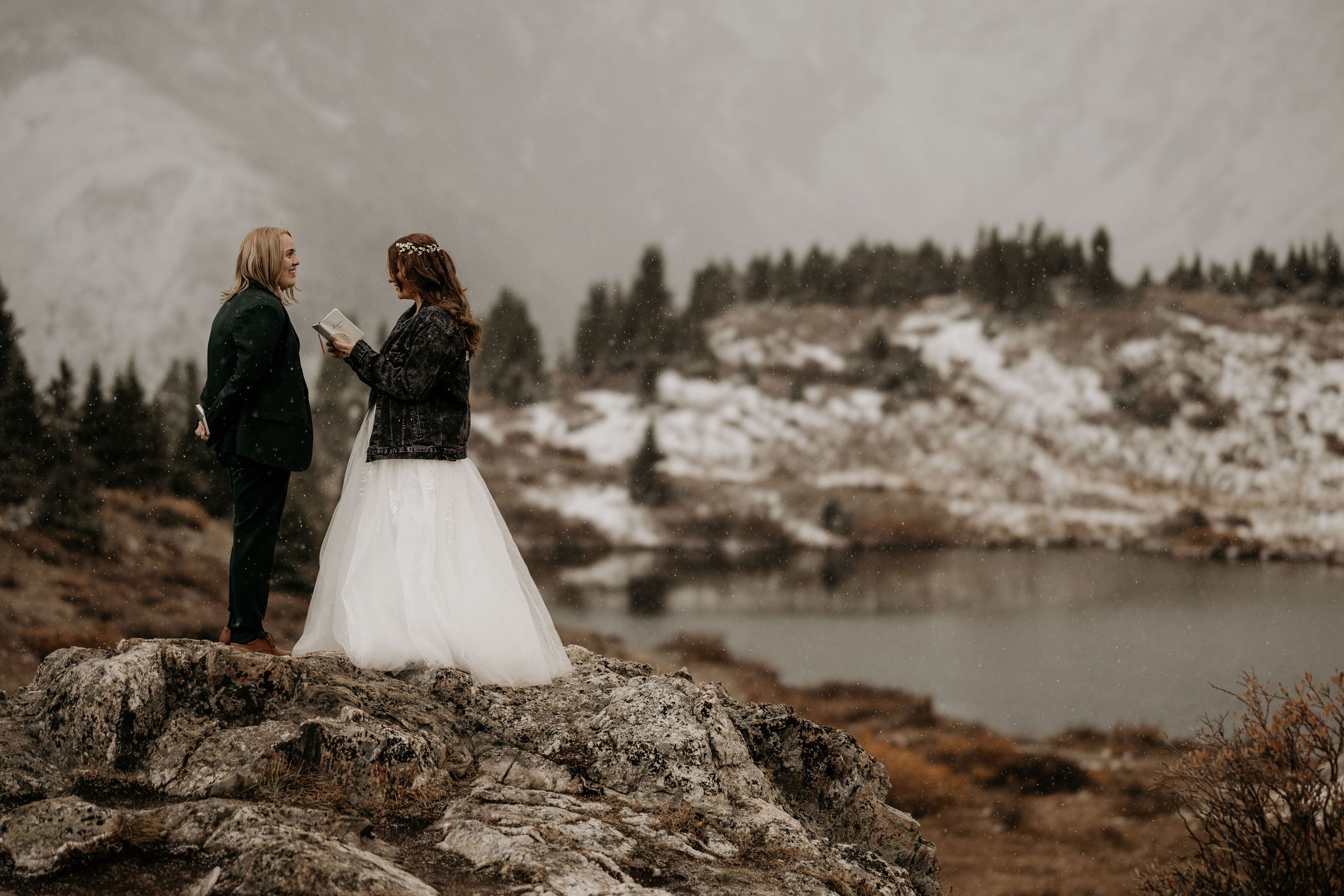
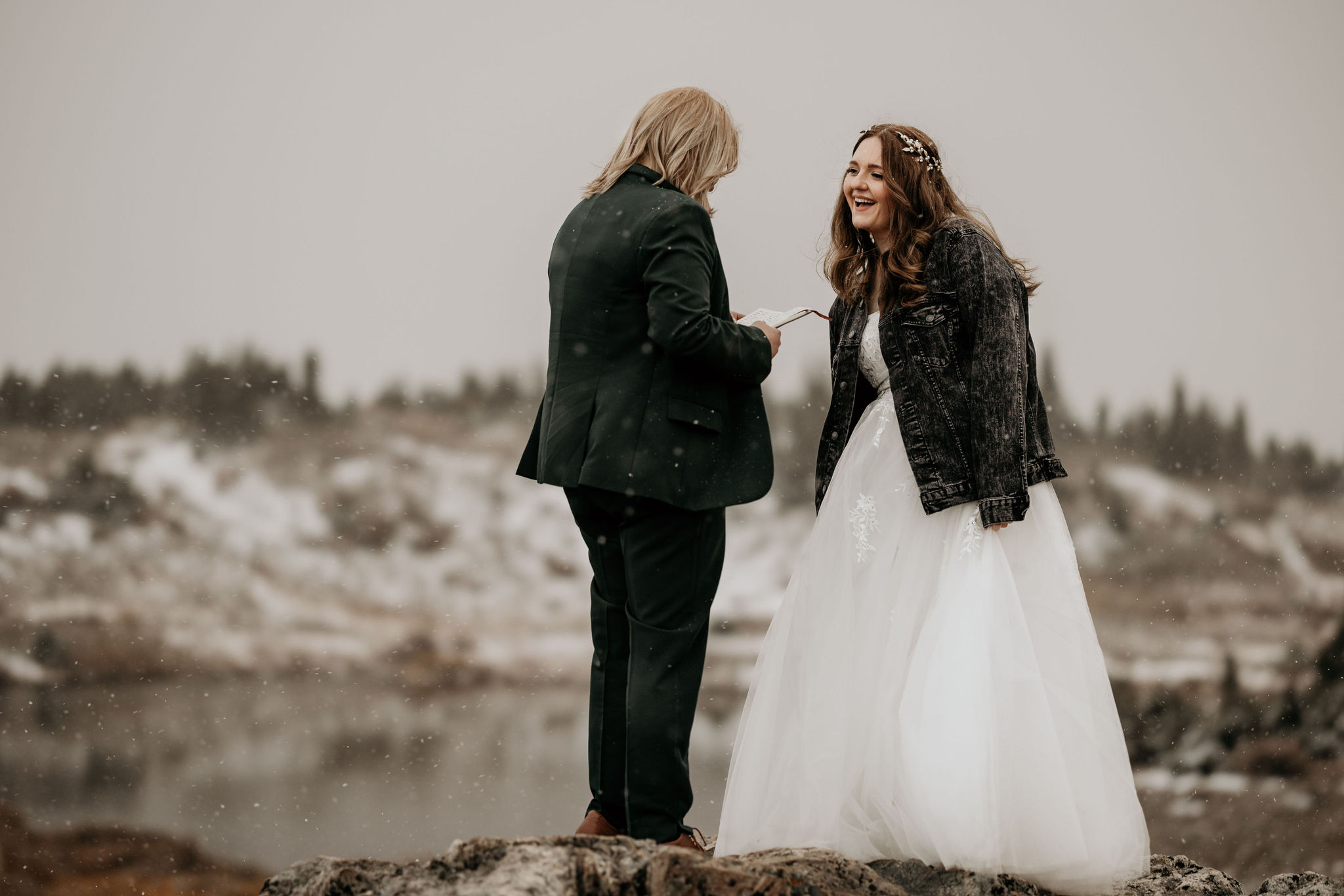

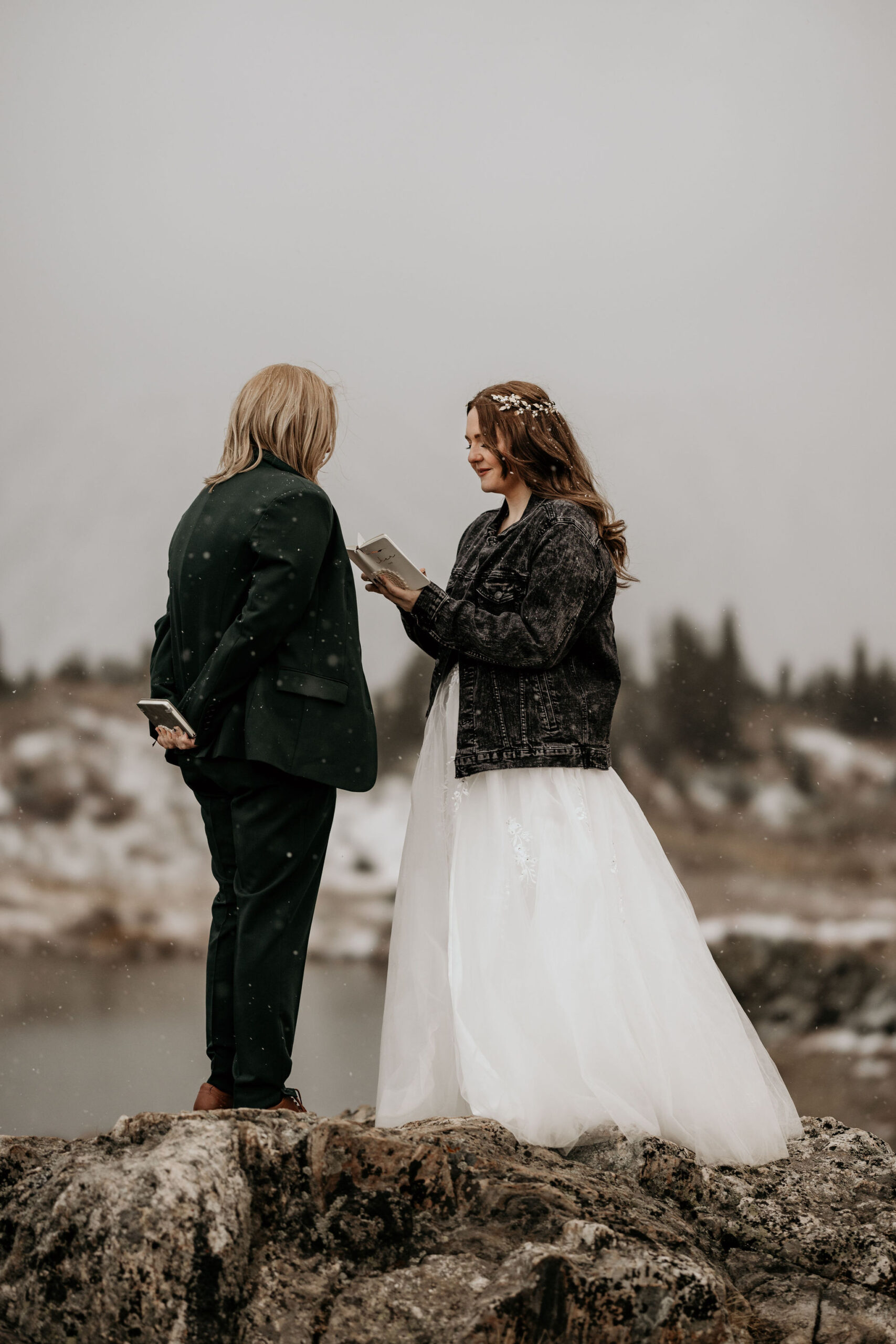
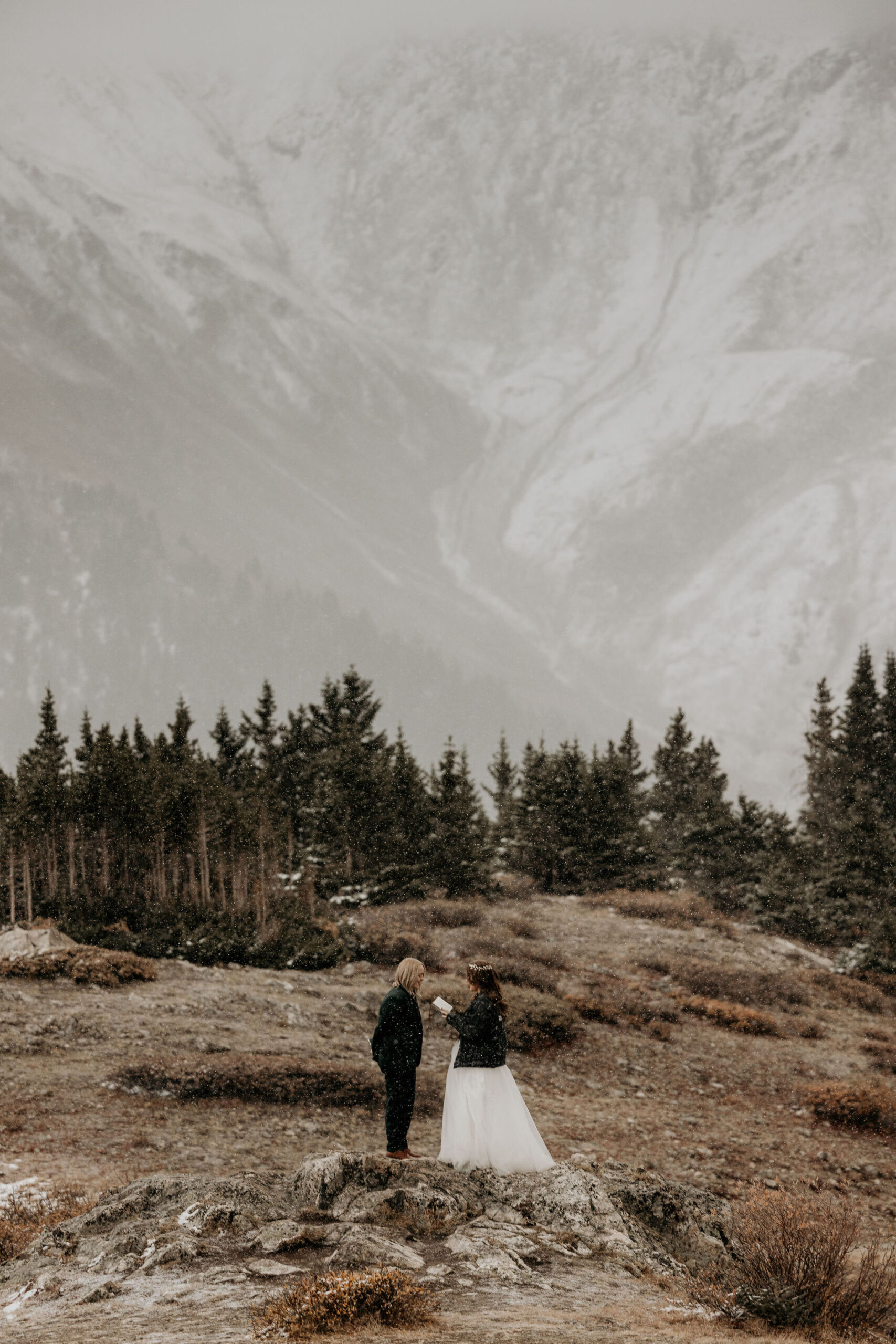
Write Your Own Vows
Writing your own vows is a deeply moving way to personalize your ceremony, regardless of whether you’re self-solemnizing. There’s something incredibly special about exchanging words of affection, promise, and commitment that are uniquely yours. Incorporate special memories, inside jokes, and your hopes for the future. You’ve embarked on this remarkable journey together. Expressing your love and commitment in your own words is a powerful way to create an unforgettable moment and celebrate the adventure that lies ahead.

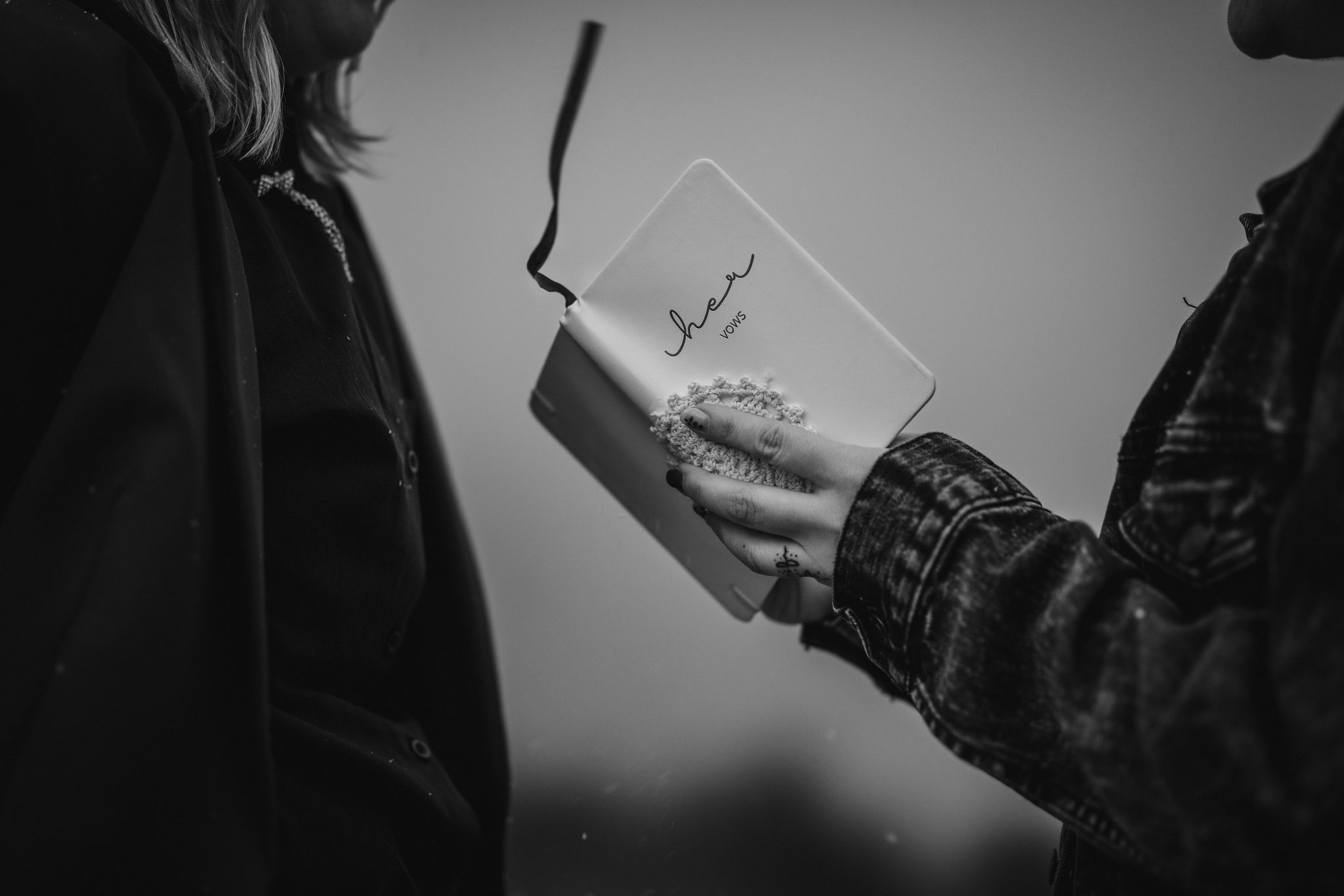
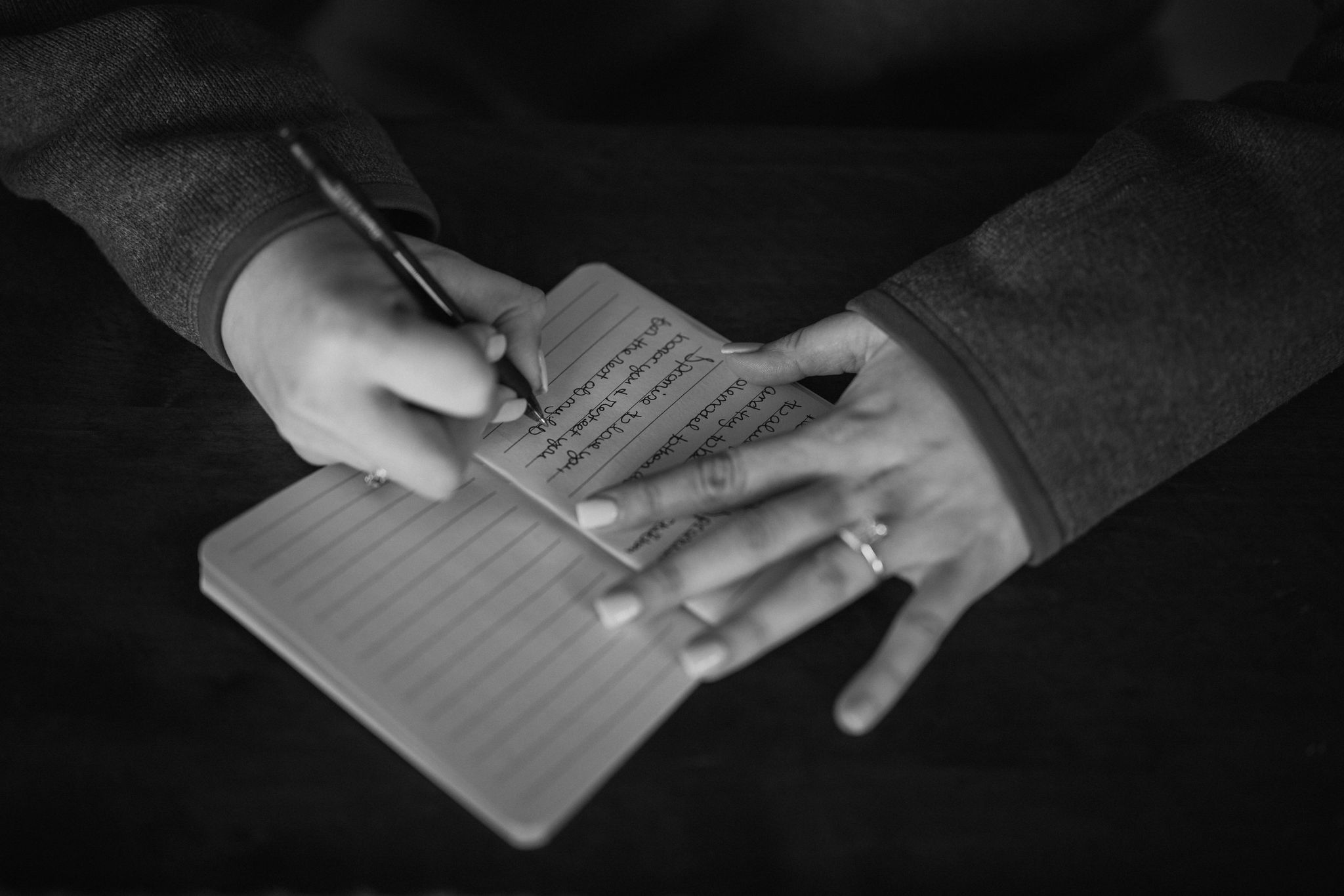
Tips for Writing Your Vows:
Start Early: Give yourselves plenty of time to reflect on your feelings and the journey you’ve shared. Make a running list of themes and ideas that you may want to include in your vows as they come to mind.
Find Inspiration: Look back at letters, photos, messages, or moments that have defined your relationship. Consider connecting some of these moments to the larger themes of your relationship in your vows.
Be True to Yourselves: Your vows don’t have to sound like anyone else’s. What matters is that they’re true to you and your relationship. Make your promises to one another specific, meaningful, and realistic.
Practice Out Loud: Reading your vows aloud as you write can help you gauge the flow and emotion of your words.
By embracing the chance to express your commitment in your own words, you create a wedding ceremony that’s not only tailored to your relationship but also resonates with authenticity and love. Writing your own vows is a profound way to underscore the significance of your bond and the journey you’re embarking on together.
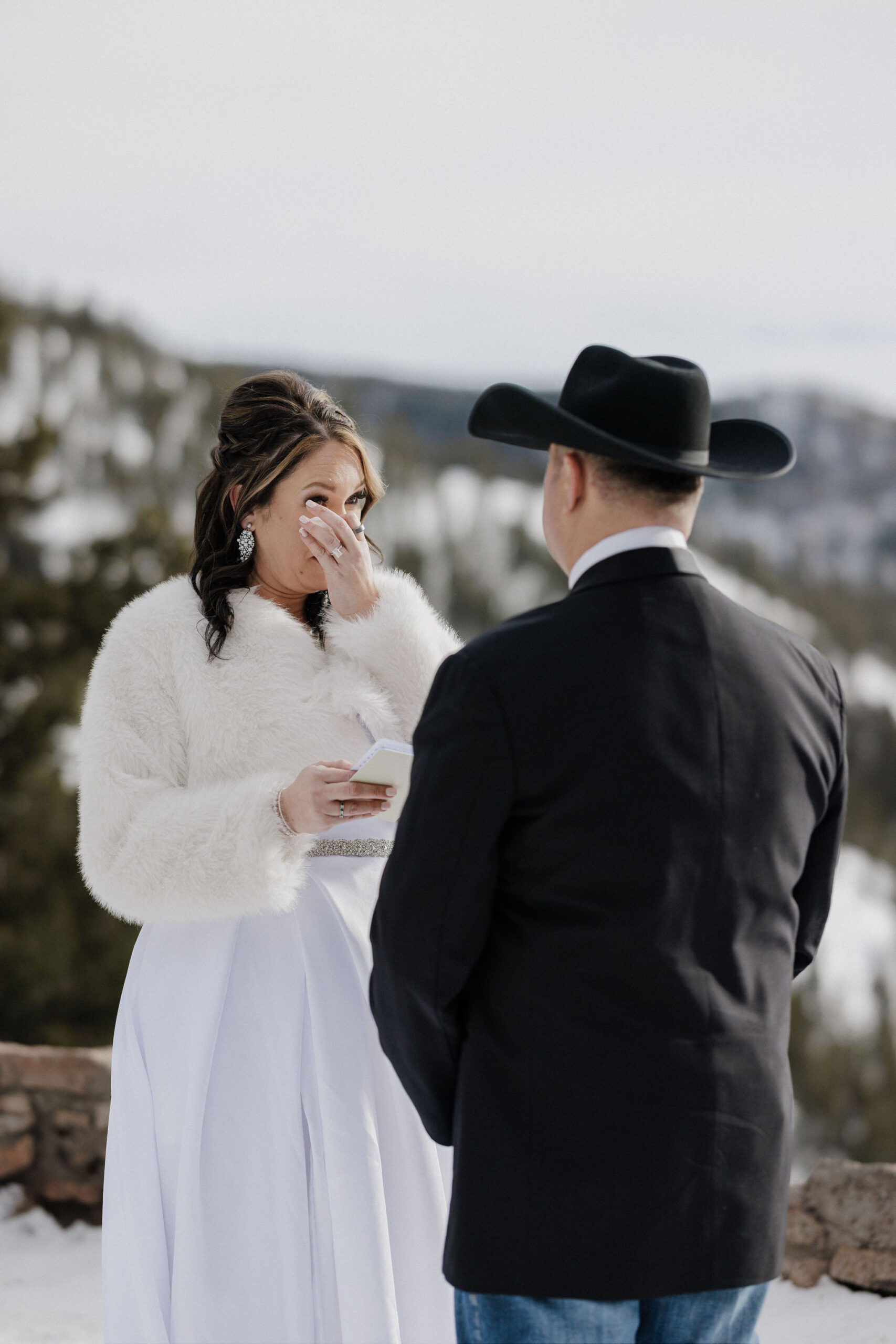
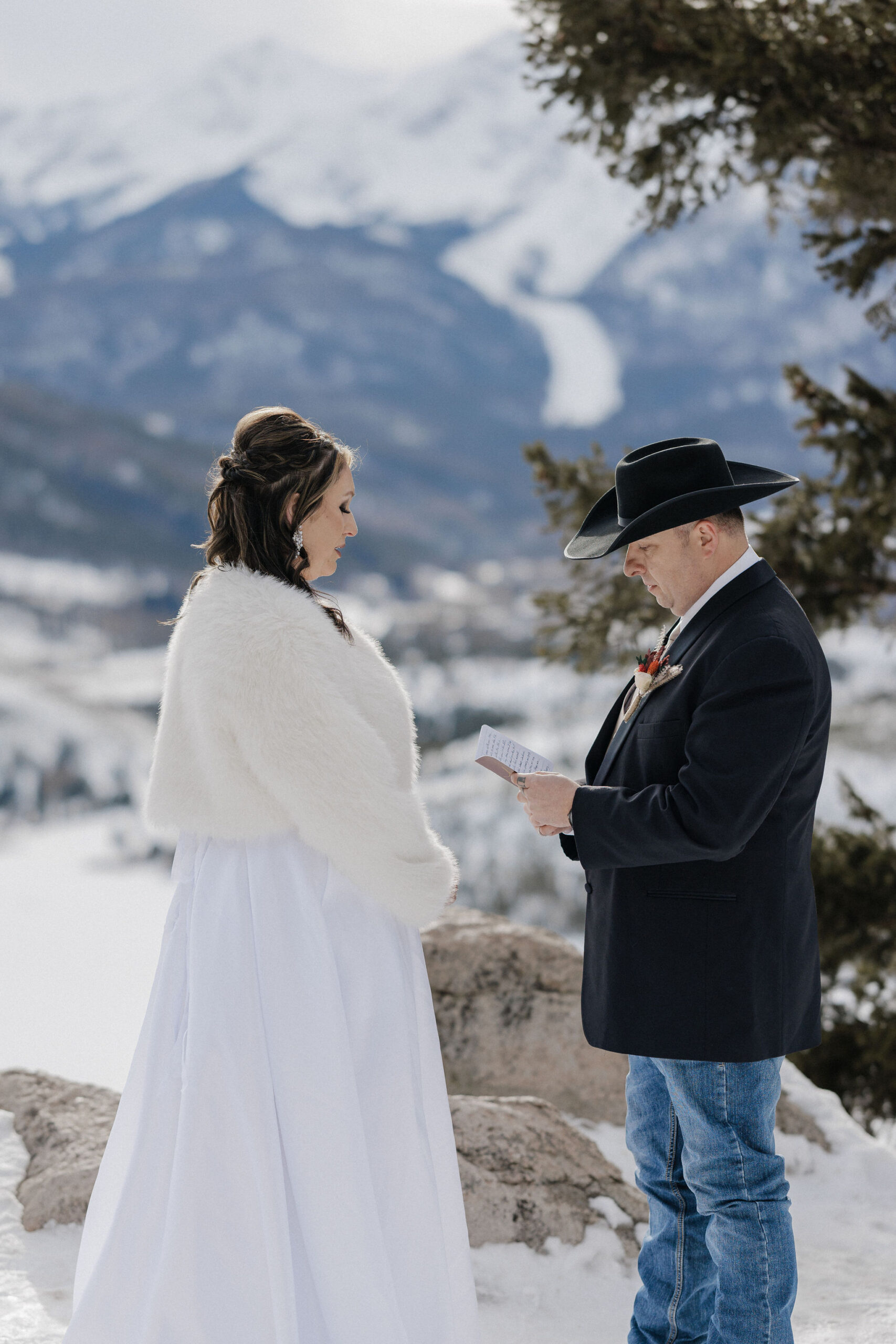
Incorporate Special Rituals in Your Wedding Ceremony
Incorporating cultural, spiritual, religious, or nonreligious rituals in your ceremony can add depth and significance to your wedding or elopement. Whether you choose a traditional ritual like “handfasting” or opt for a contemporary practice such as signing your marriage license during your ceremony, these rituals symbolize your commitment and honor your heritage and values.
Popular rituals like “jumping the broom” signify sweeping away the old and welcoming the new, while handfasting symbolizes union and commitment. By incorporating these rituals, you can infuse your ceremony with meaning and create lasting memories of your special day.
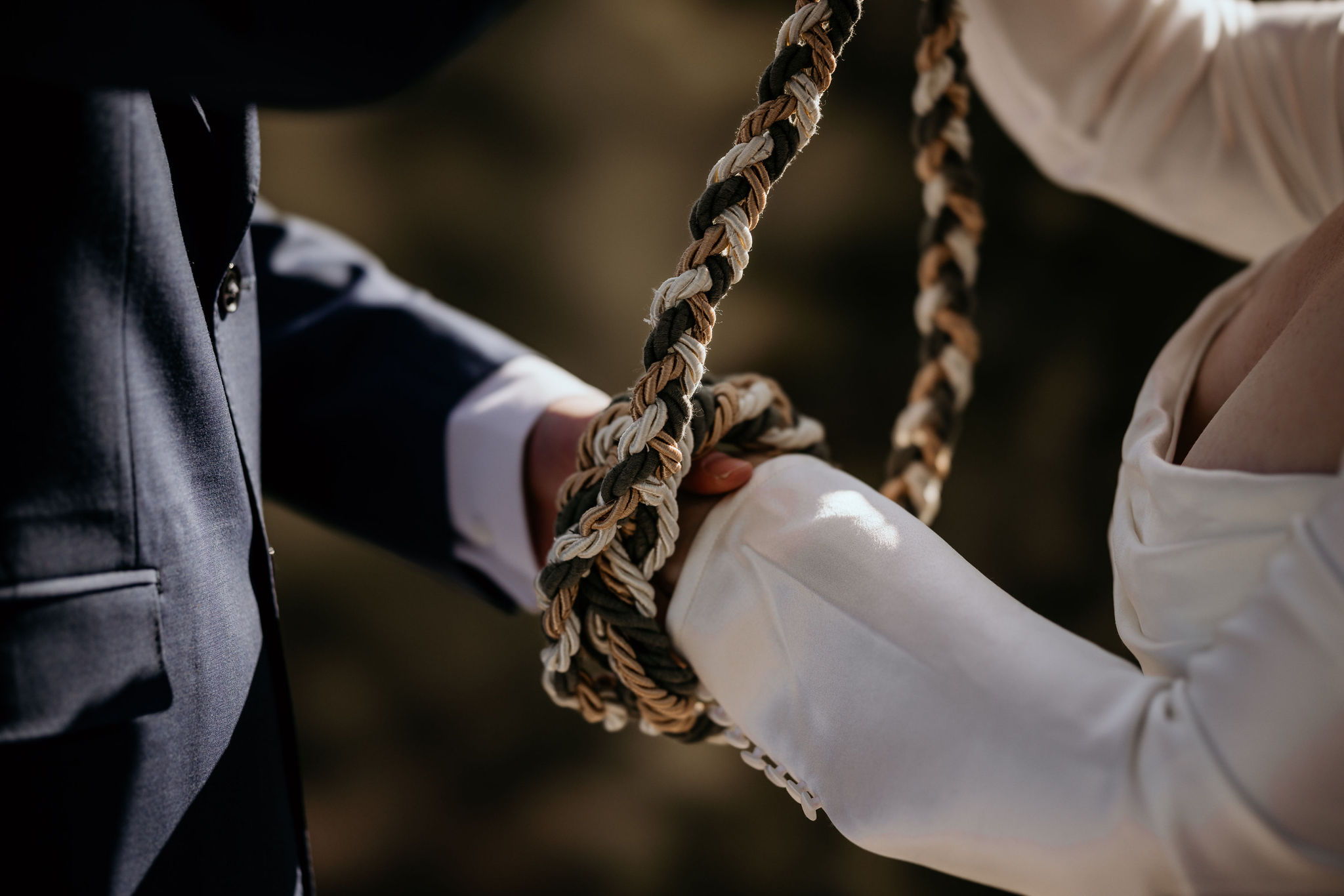
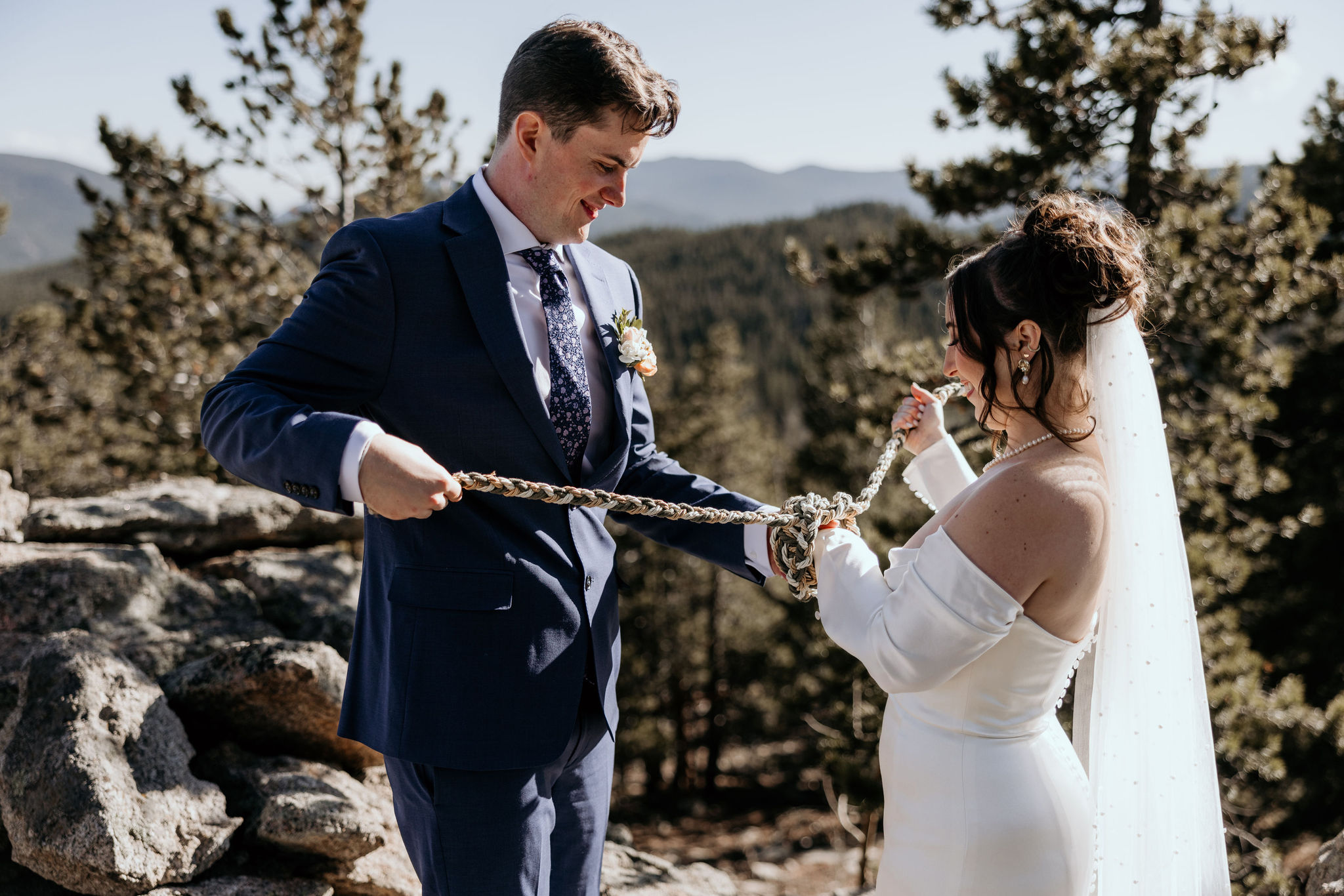
Do A Unity Ceremony
Incorporating a Unity Ceremony is another impactful way to enrich your wedding or elopement ceremony. This ritual symbolizes the merging of two lives into one, celebrating your union in a profound and symbolic manner. There are endless creative options to combine two elements to create a third, greater one, thereby expressing the symbolism of your union.
You can choose to mix crystals, blend water and soil to plant a tree, join flames to light a unity candle or intertwine sands or soils from two meaningful geographical locations. Whatever elements you select, your unity ceremony serves as a powerful representation of your commitment and the journey you’re embarking on together.
Showcase Your Talents
You can also infuse your ceremony with your unique talents and creativity, further personalizing and adding a bit of extra romance to your special day. Consider presenting your partner with a homemade gift or express your feelings through a heartfelt poem or original song. These personal touches create memorable moments that celebrate your love in a deeply thoughtful way, leaving a profound impression on both you and your partner.
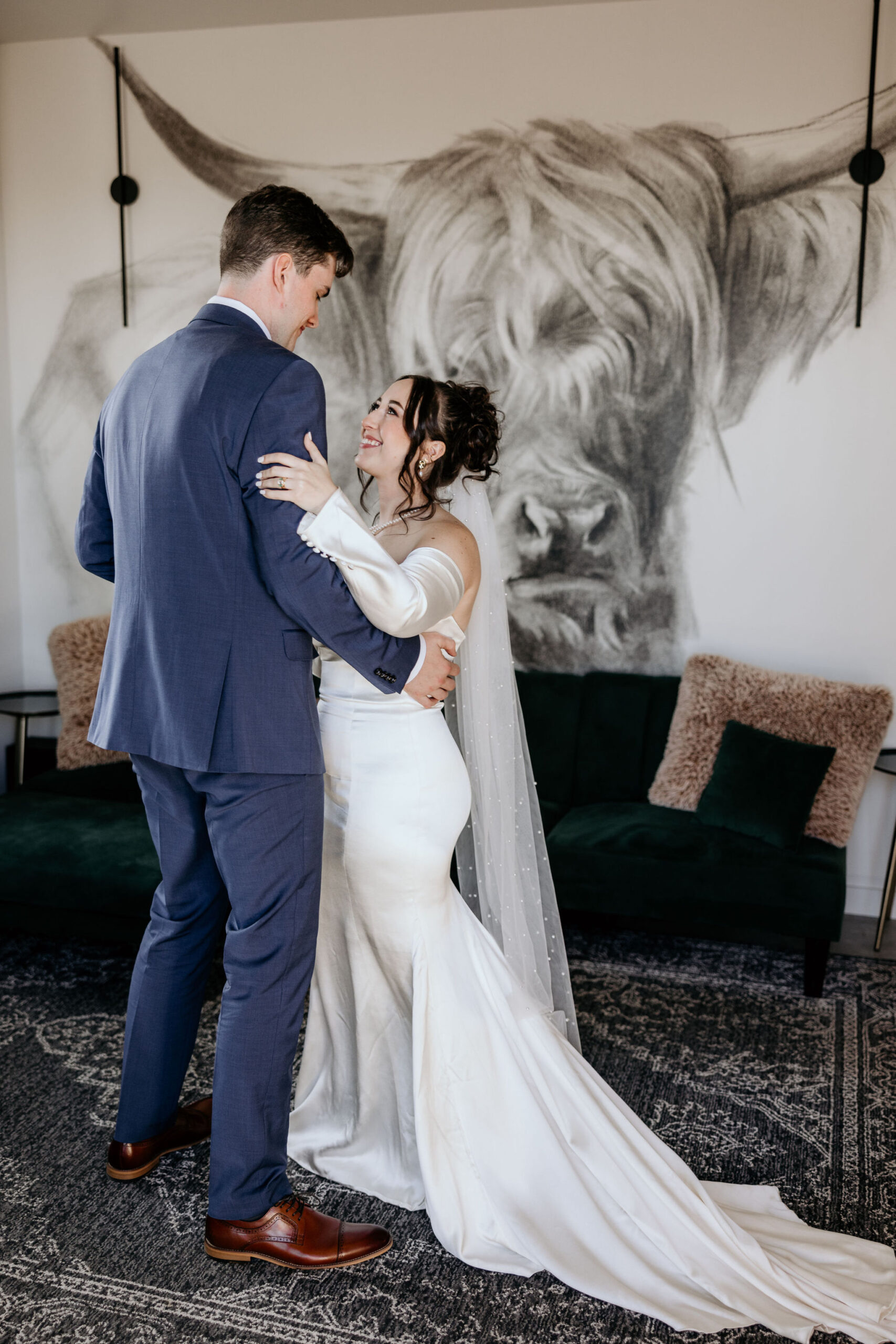
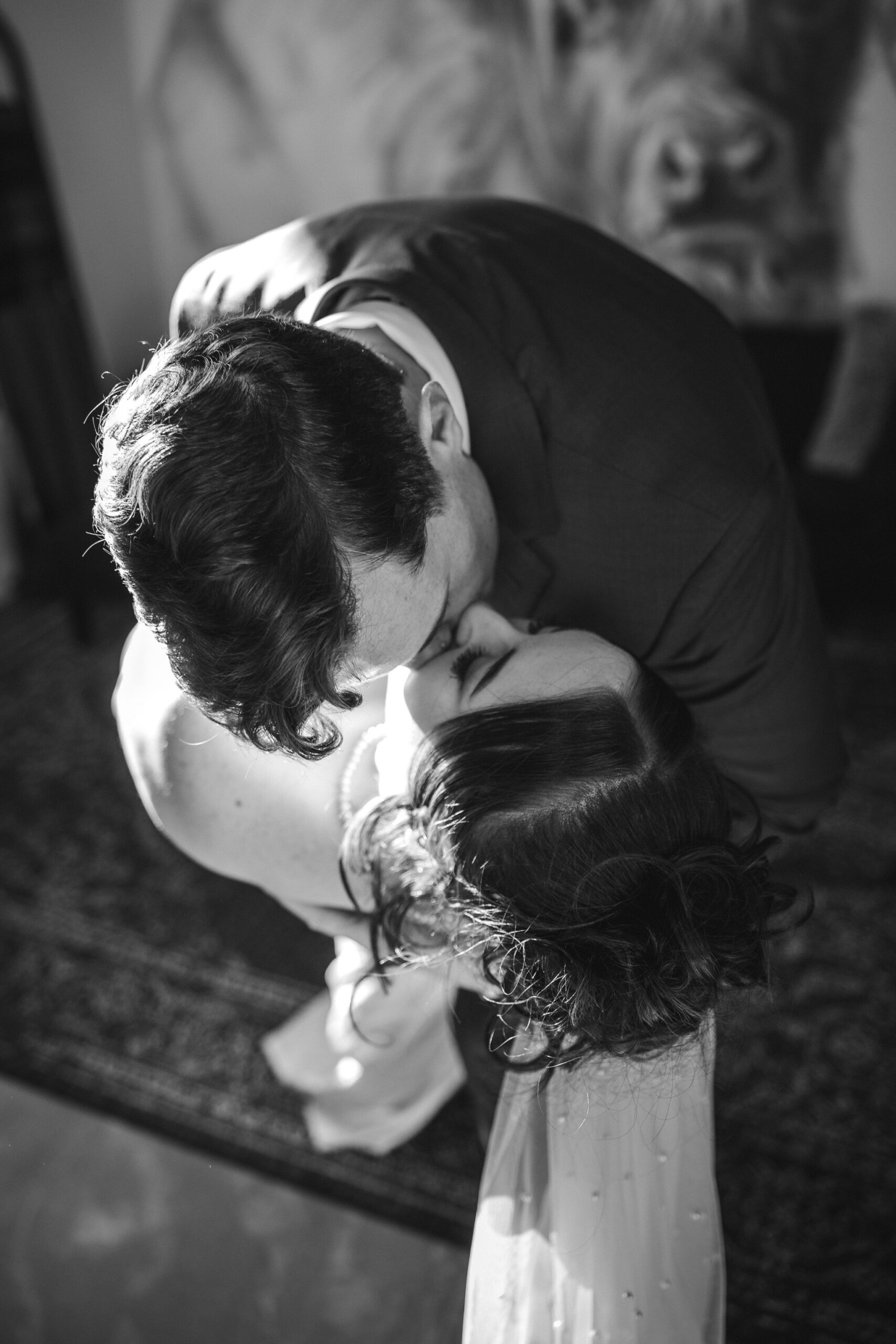
Incorporate Moments of Remembrance for Those Who Couldn’t be There
Honoring loved ones who are no longer with you on your wedding day is a deeply personal and meaningful gesture. There are various heartfelt ways to incorporate their memory into your celebration, allowing their presence to be felt in spirit. One touching option is to reserve a special seat at your ceremony or dinner table, symbolizing their enduring significance in your life. Lighting a memorial candle during your ceremony can also serve as a poignant reminder of their lasting impact as you embark on this new journey together.
Another approach is to create a memorial table adorned with photos, candles, and keepsakes, to share cherished memories of your loved one. For a more intimate tribute, consider integrating something borrowed from them into your wedding attire, such as a patch of their clothing sewn into your gown or suit or wearing a special piece of jewelry to keep their memory close throughout the day. Whatever form your tribute takes, the most important thing is that it brings comfort and warmth to your wedding day, honoring the love and memories shared with those who are no longer physically present.
You can find additional tips and guidance on navigating the wedding planning process while grieving in my other blog post.
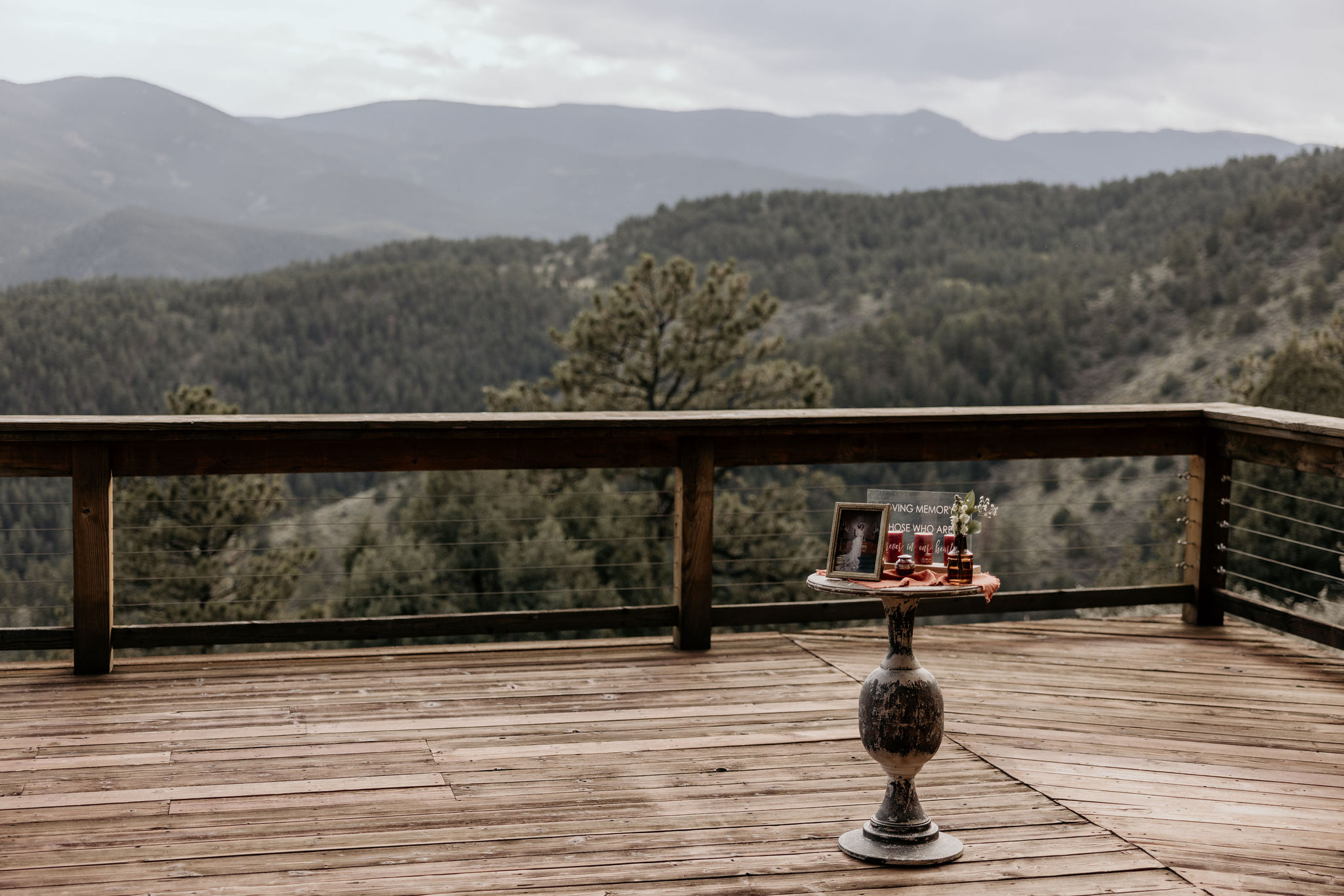
How Does Self-Officiating Work?
Self-solemnizing in Colorado offers you the freedom to craft a ceremony that authentically reflects your unique love story. While Colorado has no legal requirements dictating what must be included in your ceremony, having a basic script can provide structure and ensure that both you and your partner are on the same page. Below, I’ll outline a basic wedding ceremony script, which you can fully customize to suit your preferences, vision, and personalities.
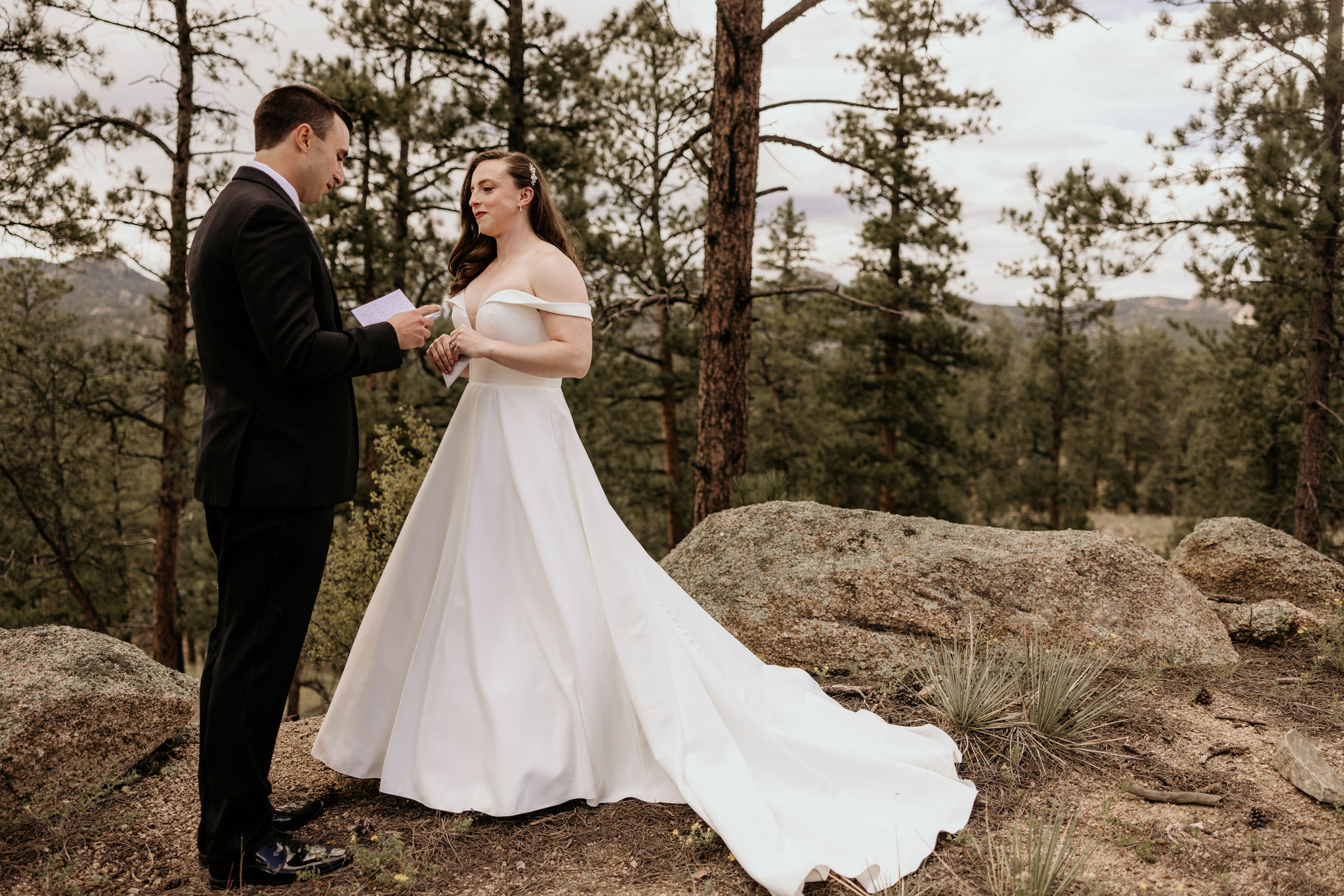
Introduction: Without an officiant, starting your ceremony may feel unfamiliar, but there’s no “true” way to begin. You can keep it simple with a smile, a squeeze of hands, or a meaningful glance. Alternatively, you can make it clear by asking your partner, “Are you ready?” or engaging in a game of rock, paper, scissors to decide who will read their vows first.
Vows: Your vows are the heart of your ceremony, where you express your love, promises, and commitment to one another. There are no rules here – let your words flow authentically from your heart. Whether reciting traditional vows, writing your own, or sharing personal sentiments, this is your opportunity to declare your love and commitment openly and sincerely.
Proclamation & Declaration (The ‘I Do’ Moment): In this part of your ceremony, you affirm your decision to marry each other. While some states require that you include specific language in your declaration, Colorado allows you the freedom to tailor this moment to your preferences or choose not to include it at all.
Ring Exchange: Exchanging wedding rings represents the everlasting bond between you and your partner. If you choose to include an exchange of rings in your ceremony, consider taking the moment to affirm your commitment to one another and pledge to support and cherish each other for a lifetime.
Presentation: Why not conclude your ceremony with a celebratory moment that reflects your joy and excitement for the journey ahead? Share a kiss as you’re pronounced partners for life, or express your happiness in any way that feels right – whether it’s a happy dance, a joyful yell to the mountaintops, or a quiet moment of reflection in nature.
Your self-solemnizing Colorado ceremony is a beautiful opportunity to create a meaningful and unforgettable memory that celebrates your love and commitment to each other. Embrace the freedom to design a ceremony that authentically reflects who you are as individuals and as a couple.
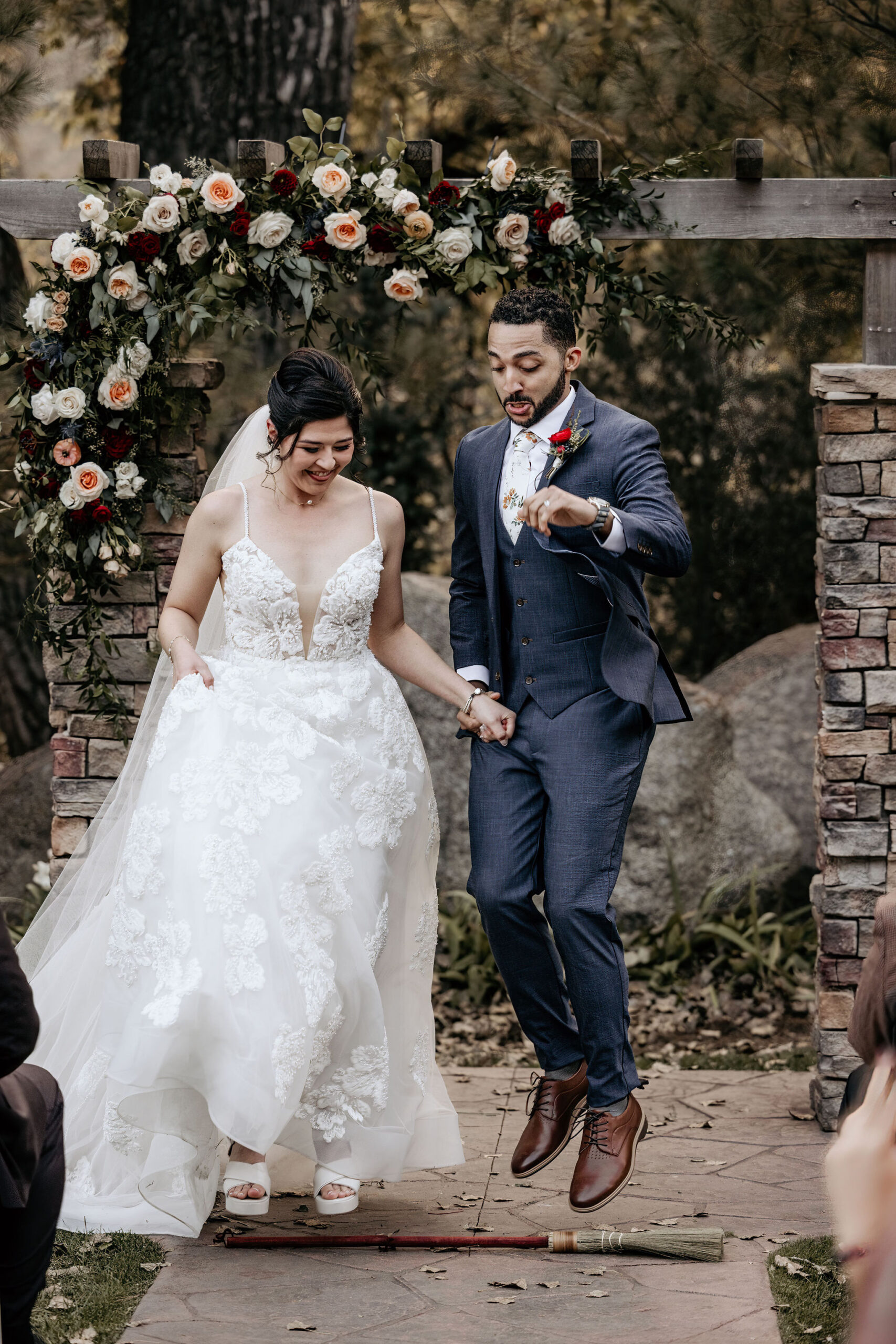

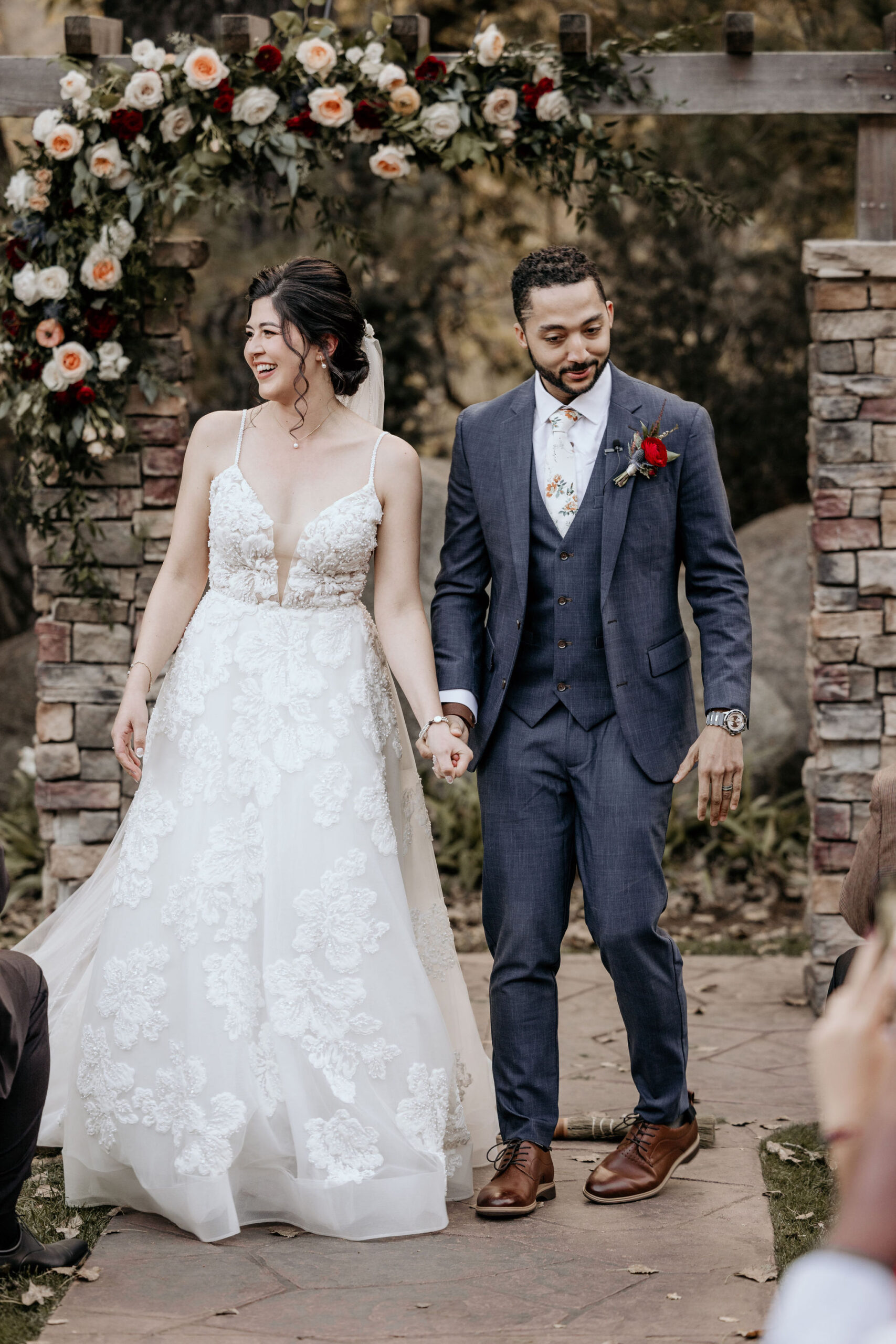
Completing Your Marriage License for Self-Solemnization
Your Marriage License and Marriage Certificate are combined on one piece of paper and should not be separated. Your license grants permission from the state for you to marry, while your certificate is what you will complete on your wedding day to document where and when you were married.
On your marriage license, both you and your partner will be referred to as “Party.” The lower section, which you’ll complete, must include the county of your wedding, the date, and the location’s address or description. This could be an Airbnb address or a public location like ‘Rocky Mountain National Park’ or ‘Sapphire Point Overlook.’
As a self-solemnizing couple, both you and your partner will sign on the “Signature of Officiating Party” line and write the words “Self-Solemnize” on the “Title of Officiating Party” line. Additionally, each of you will sign on the respective “Party 1” and “Party 2” lines on the bottom left of the document. If you have a witness, they can sign on the designated line.
To return your signed license, you can mail it or use the Clerk and Recorder drop box at the Webb Municipal Building. Be sure that your license is returned for recording within 63 days of your marriage to avoid extra fees. If you return your marriage license after 63 days have passed, you will be assessed a $20 fee with an additional $5 assessed per day up to a maximum of $50, so try to return your marriage license as soon as you can.
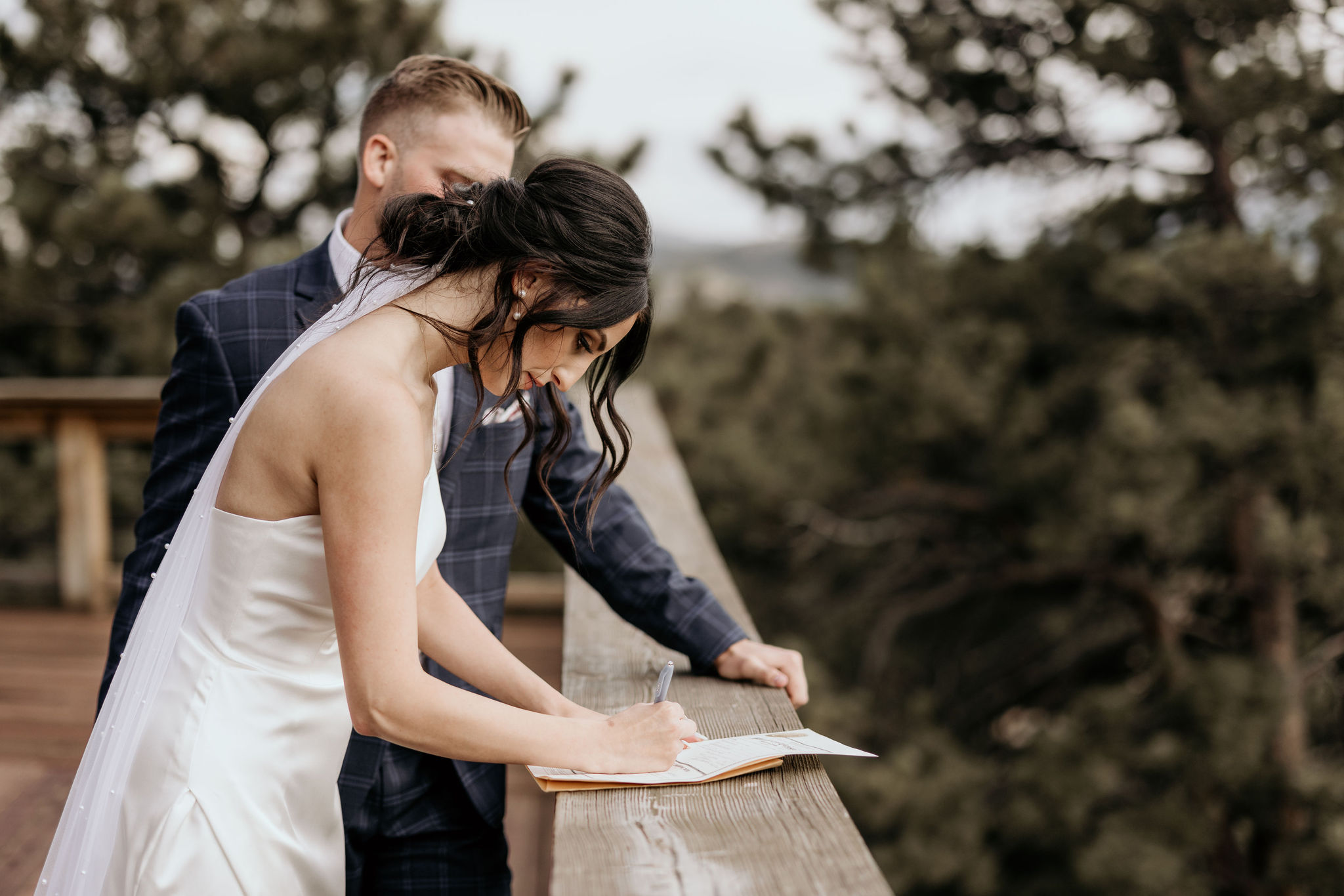

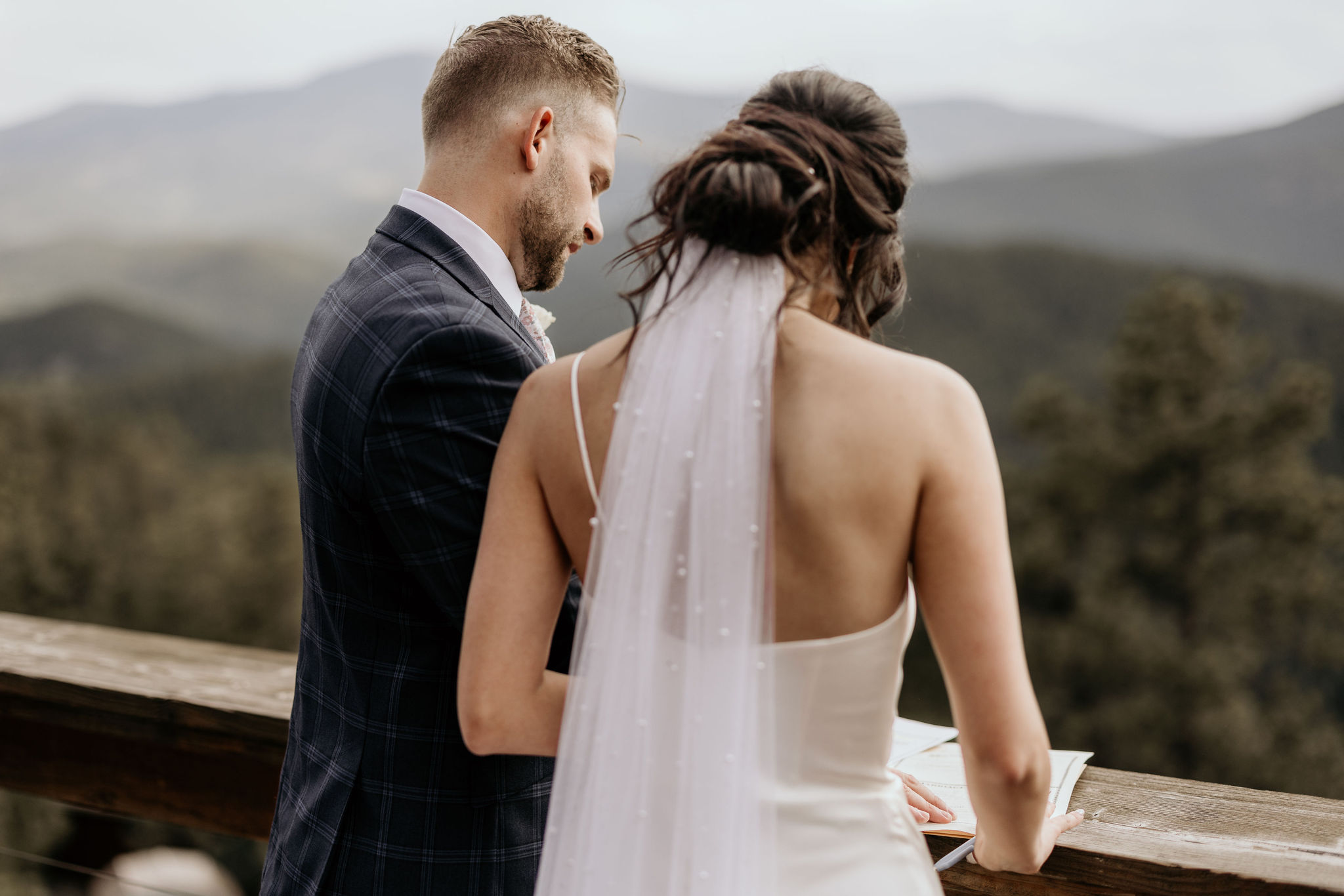
Let’s Plan A Self-Solemnizing Micro Wedding or Elopement
Self-solemnization in Colorado offers couples a unique opportunity to craft a deeply authentic wedding experience. From obtaining your Colorado marriage license to planning your self-solemnizing ceremony, every step is filled with freedom and flexibility.
As you navigate the logistics of completing your marriage license and planning your ceremony, remember that the heart of self-solemnization lies in the love and commitment shared between partners. Find joy in the freedom to design a ceremony that speaks to your souls and shared vision. When you’re ready to embark on this exciting journey, I’m here to help bring your dreams to life.
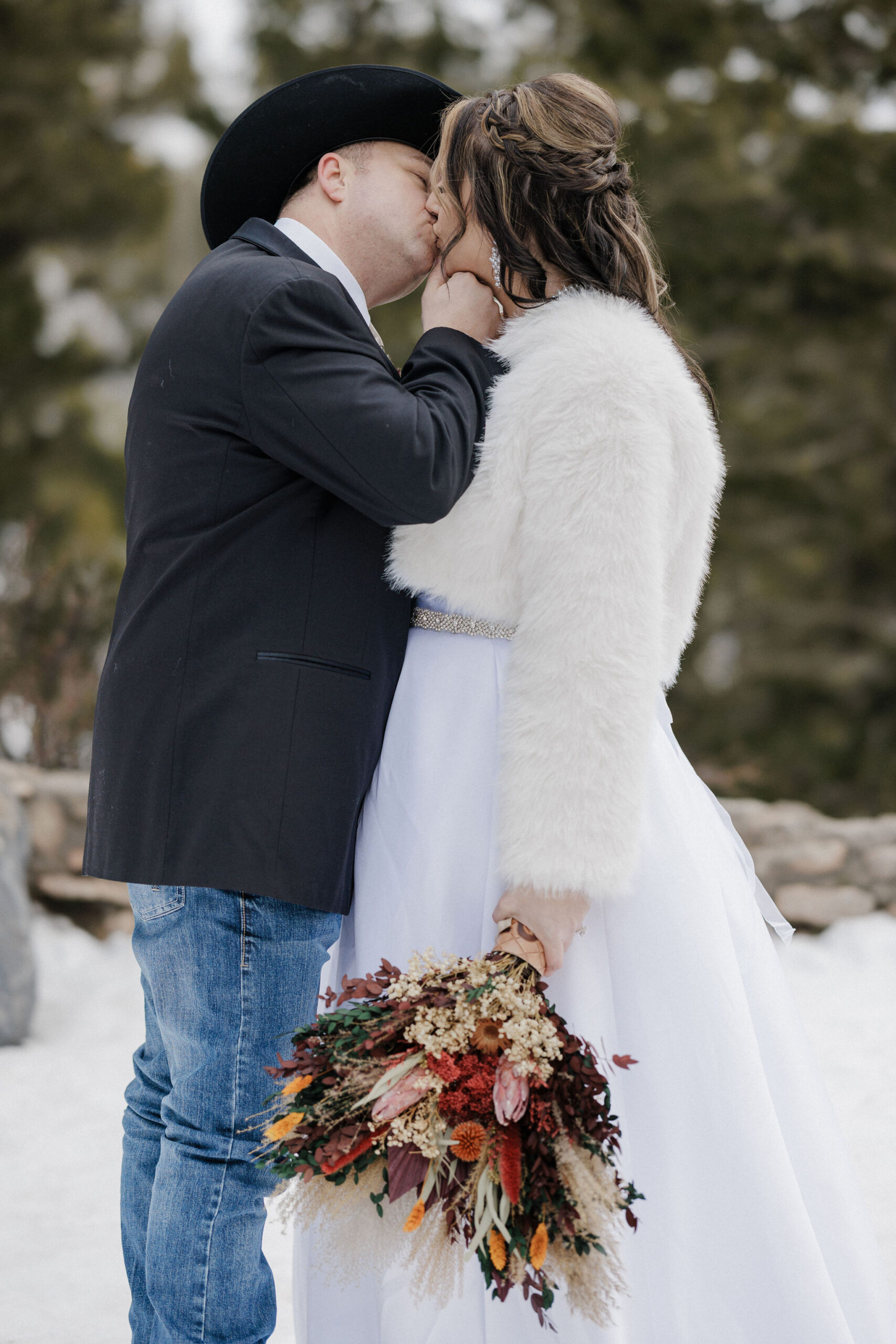
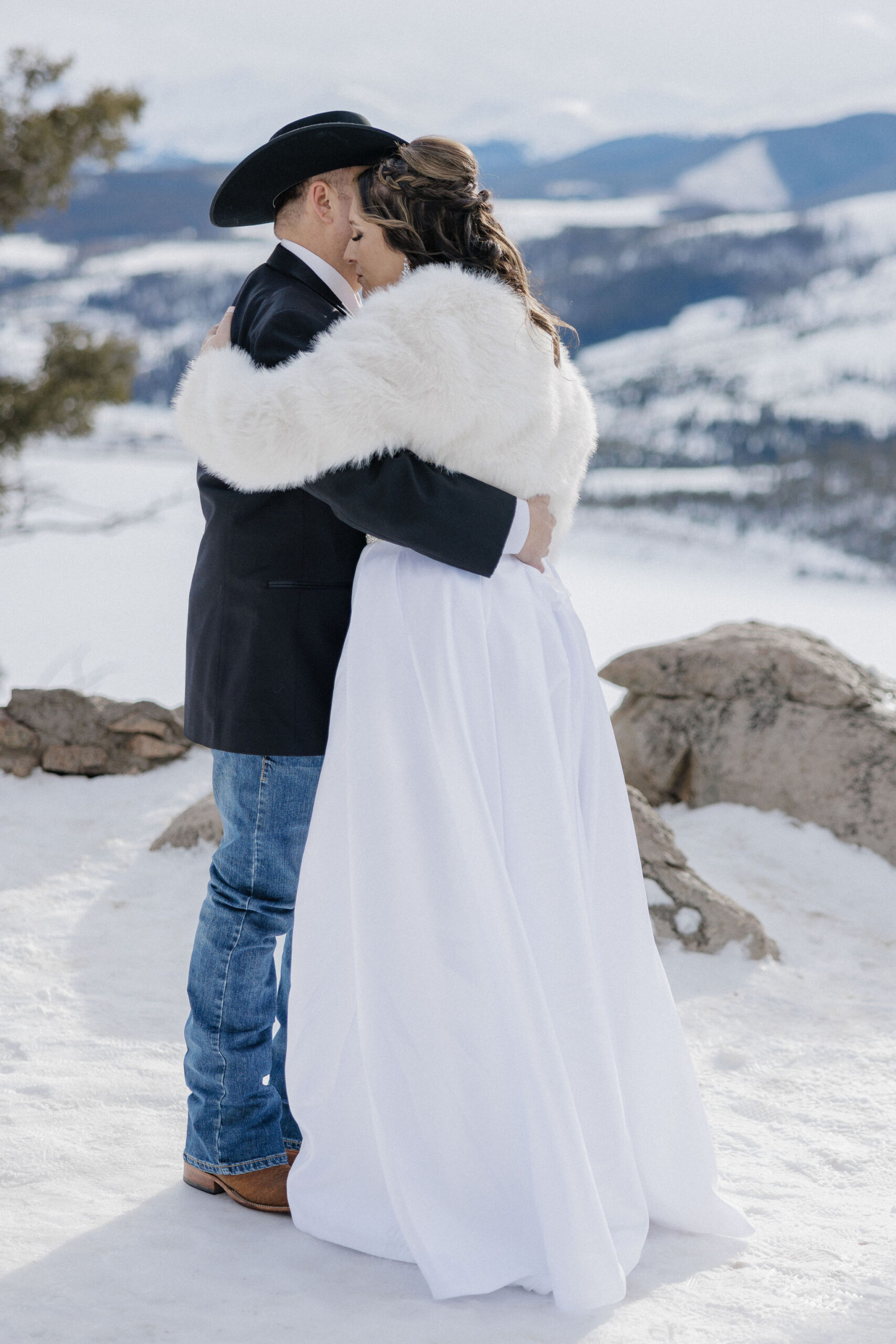
Leave a Reply Cancel reply
Celebrate as your truest self!
Subscribe for 5 planning tips for an authentic wedding day.
contact
about
blog
Couples
Microweddings
elopements
Western Microwedding + elopement photographer
©2024 stephanie Yves photography | all rights reserved | privacy policy | print release | site credit karima creative
Denver | Breckenridge | Boulder | Colorado Springs | Estes Park | Destination | Airbnb | VRBO | Micro Weddings